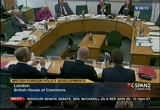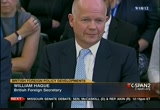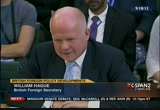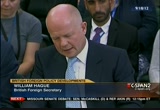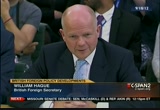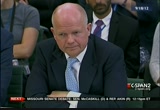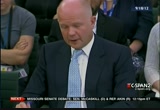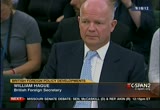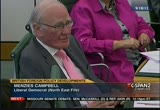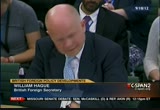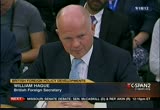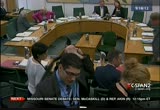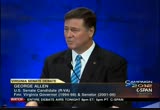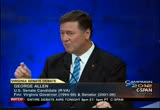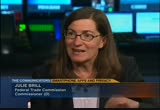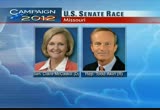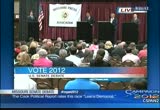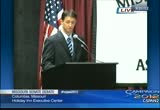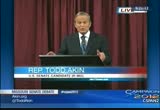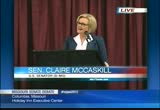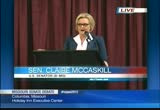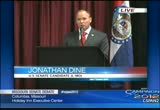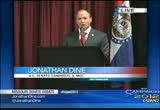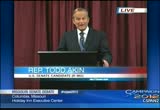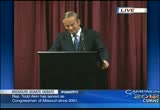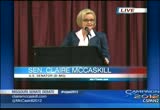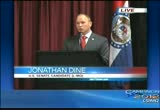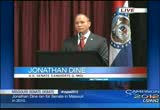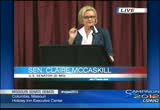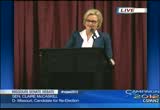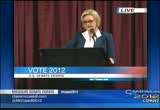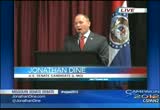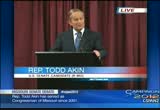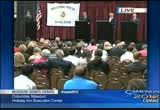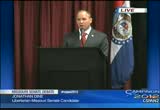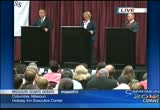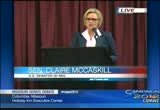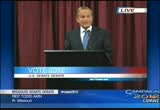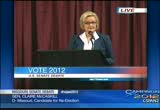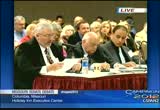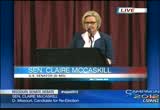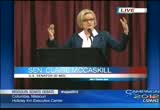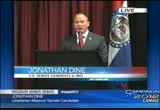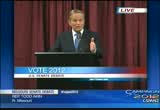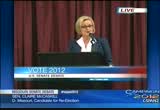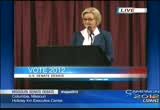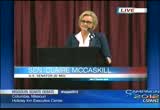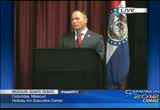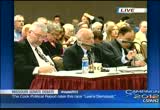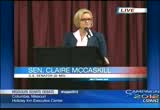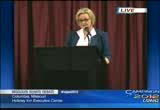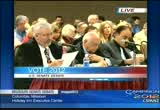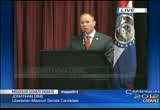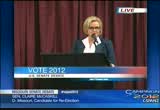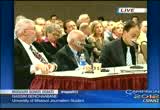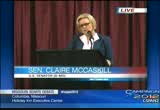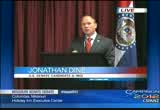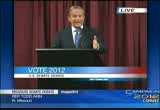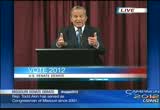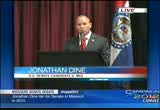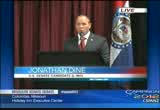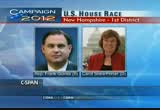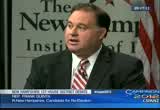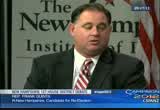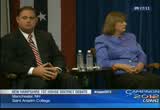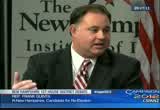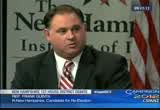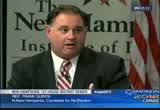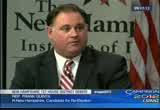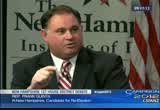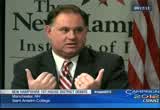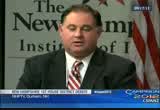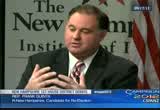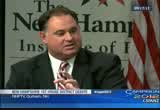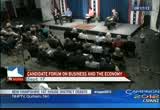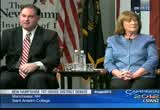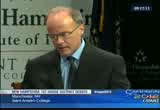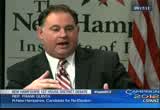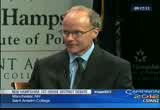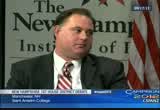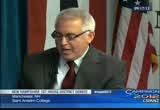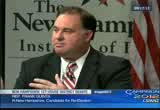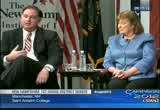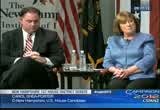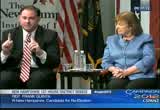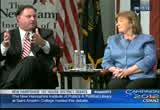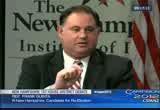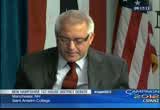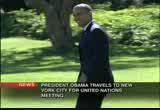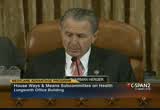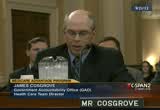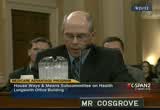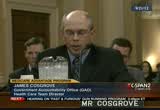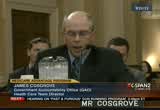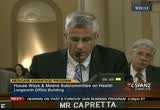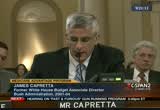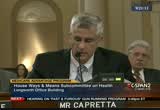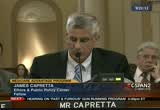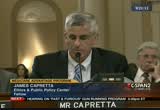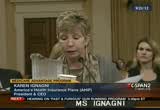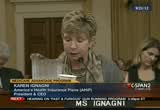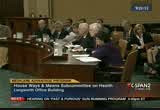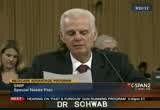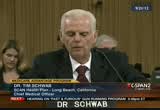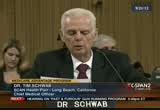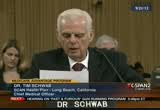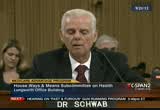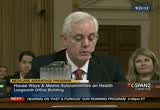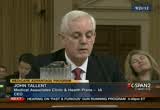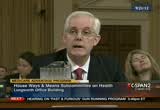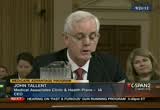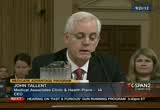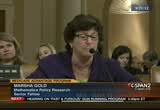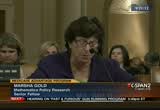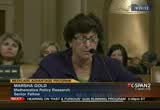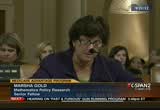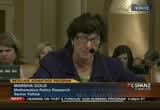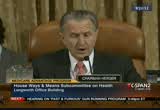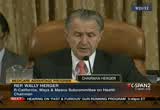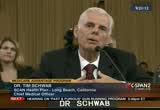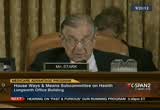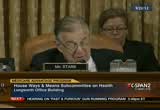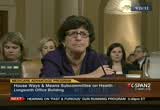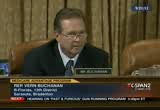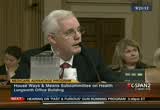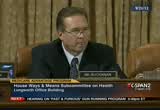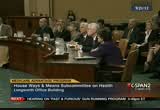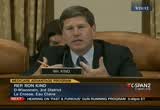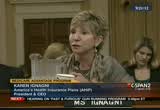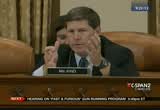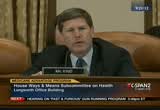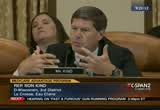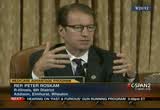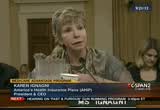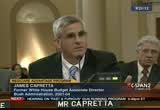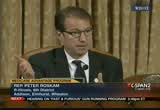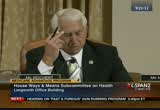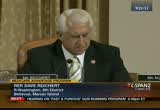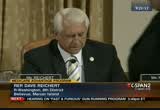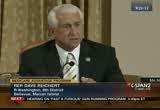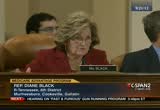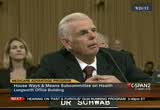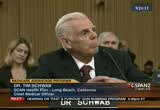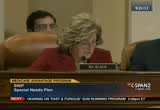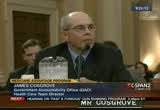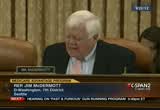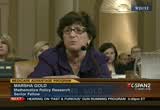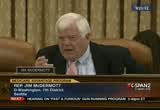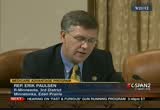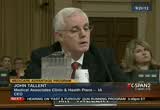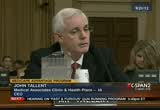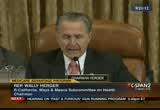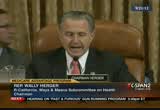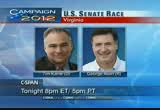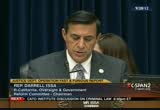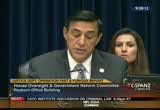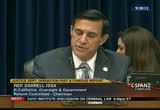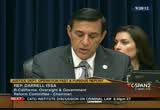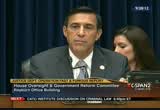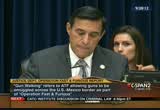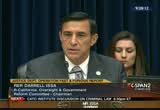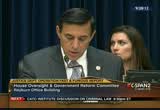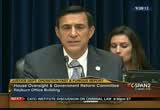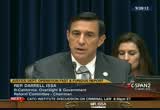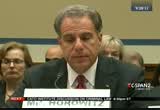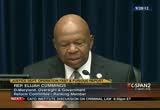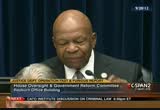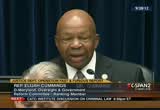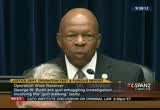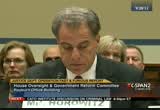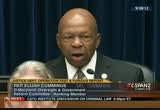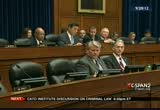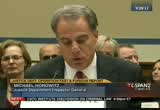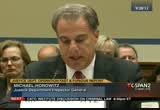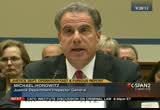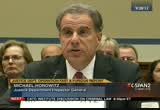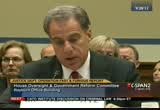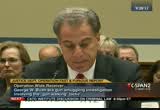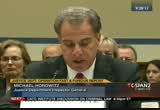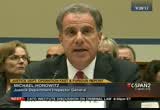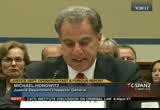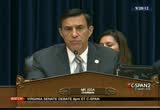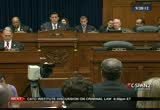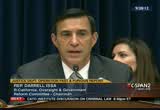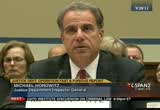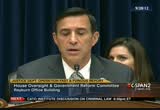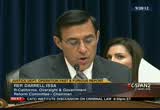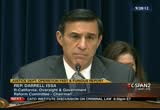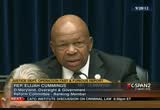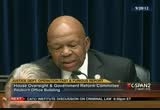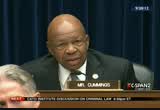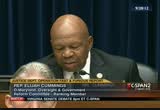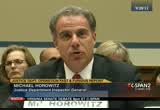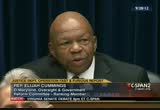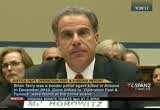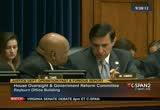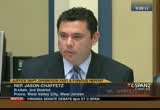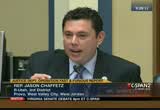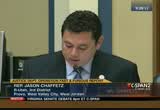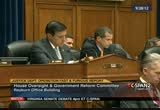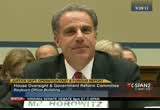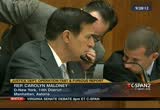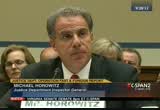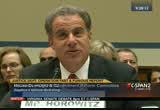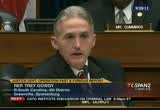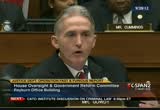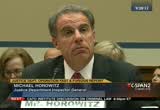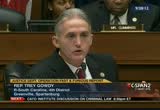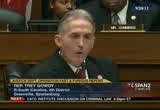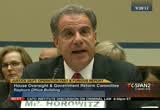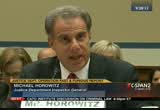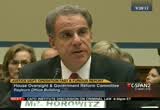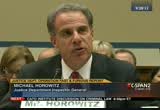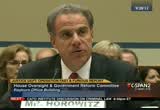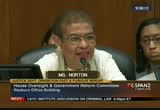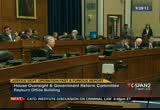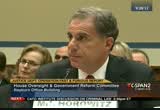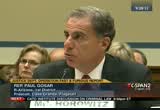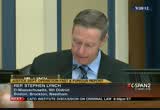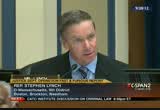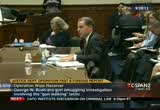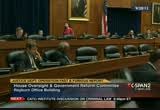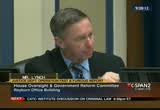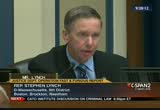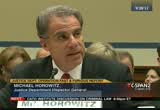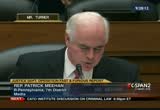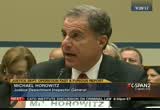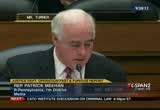tv U.S. Senate CSPAN September 24, 2012 12:00pm-5:00pm EDT
12:00 pm
loaded question. i think it was the right thing to do. you wanted the governor of ecuador to know that -- before they made a decision about granting what they call under the 1954 agreement diplomatic asylum, a concept we do not recognize. if they did so, that would not be a division that would find much favor in law in the united kingdom. we worked on an agreed texts with them. it's about their legal position in the u.k. which remains the legal position which was not a threat with them a clear at the time and have since made clear with the vice president of ecuador on the 29th o august.
12:01 pm
this does not imply a threat to the united kingdom and is a strong upholder of international law of the vienna convention, the relevant act of parliament include a commitment to international law but we have our own legal responsibilities. our own extradition laws. we will fulfil those with -- to fill those responsibilities. you wanted to make all that clear and we continue to make that clear. >> there have been a number of eminent critics he said the foreign office has slightly overreached themselves. another former ambassador said they made a big mistake it was skeptical. that is not issued a threat.
12:02 pm
it is a question of semantics. >> people have their opinions. i am not sure the word slightly is a particularly damning criticism. people are entitled to their opinions. we have stated that our position. ecuador stated their position. we have the same situation as before. both countries are willing to negotiate about it. the legal position it -- is different. our position is very clear. they're contacted this -- diplomatic asylum is one that we not recognize. we have agreed to continue to talk about this. given the different legal --
12:03 pm
there is no solution in sight at the moment. but we will continue to be available to talk to ecuador about it. >> say you are continuing to talk? >> the particular work that is referred to in and the memoir, there were seven meetings before then between the u.k. and ecuador. it shows the work was going on. that work well attach to leave in our view the embassy. be made very clear -- we have made very clear that it would have had to have had that results. that remains the position. we have not gone backwards in 04 words. remained -- or forwards.
12:04 pm
we reamin at the impasse -- remain at the impasse of ecuador. i have set out to him as i have said in public, all the responsibilities of the united kingdom and sweden have under the european convention on human rights, if ecuador fears he will be extradited. our home secretary would have to be out of commission for such extradition from sweden to another country am not able to agree to extradition. i think there are some unnecessary fears. we have tried to set my address in ecuador. a lot to continue to try to do that. we didn't we have tried to set- clear in ecuador.
12:05 pm
a lot to continue to try to do that. it is up to them how they wish to proceed. they have given no sign of doing that. the request is for extradition for syria's alleged offenses. -- for serious alleged offenses. we will fulfill its legal obligation to extradite a person in that situation. >> a couple minutes left. could you update us on the agnlo russion -- anglo russian relations at the moment. >> our objective in this government has been to improve our working relationship with russia. clearly we have some differences. we have been discussing one of
12:06 pm
them today on syria. there are differences on foreign policy. we sometimes have vigorous exchanges about human rights. -- human rights issues. it is important to have a working relationship with russia. they are a leading nation in the world, and member of the security council. we have to work with them everyday. as a personal minister level, we have created good contact, good relationships. the russian foreign minister to the u.k. last year, it was his first bilateral visit in seven years to the u.k. when i hosted him here. i have been back there this year and the prime minister president putin had a good meeting. we had a great time watching the judo at the olympics but did not
12:07 pm
make any breakthrough on syria. in the meantime, the businesses are doing well -- british businesses are doing well exporting to russia. it is one of our fastest export markets. but we do have concerns. i think it is a better working relationship but we have not given any ground for brought about any relaxation of the measures introduced after the murder of alexander. we have not received any satisfaction on that point so we have not changed any measures the of the previous government. the ability to discuss global and bilateral issues is there and we have reinforced that. >> have you expressed an anxiety towards the russian ambassador to the foreign minister about
12:08 pm
efforts to suppress dissidents, and also the fact that certain members of parliament seem to be singled out in the way because there are dissidents. in the are to be targeted. do we express views about that? >> we did express our views. the prime minister raised an issue of the pussy riot. >> you were able to identify george michael for me. >> yes, so, i am providing a continuing service. [laughter]
12:09 pm
the prime minister did raise that with president putin. we do have an actual formal u.k. russia human-rights dialogue. the last one was held here in london in july where our officials rose a range of issues, including new legislation, freedom of assembly and expression, the protection of human rights. we do not hold back from raising issues. sometimes have quite a vigorous argument. >> and there will be fewer of you to transfer matters to. you now have two part time ministers. what has been given in extremely
12:10 pm
large breed -- afghanistan, various others. -- one has been given an extremely large brief. are you confident this is it part time job? next there are six foreign office ministers and the trade minister. there were only for front office ministers in the last government. the ministerial team is much bigger than that was in the last government. it will be an excellent addition to the team and well able because of this is a possibility. i think we've been described in one of the newspapers as the happiest ministerial team. i agree with that one. [laughter]
12:11 pm
we work together so well and that will remain the case with the new members of the team. do you have a committee -- thank you very much indeed for coming in today. it is much appreciate your >> thank you. >> our live programming continues later today from the national association for business economics. economic advisers from both the obama and romney campaigns will participate in the discussion. watch that starting at 2:30 p.m. eastern live on our companion network, c-span. >> former virginia governor tim kaine and former senator george allen faced each other thursday night in one of four scheduled senate debates.
12:12 pm
the cook political report rates this race a, quote, toss-up. >> the standard bearer of the republican said, he said that 47% of americans are too dependent on government, that they see themselves as victims. i ask you pointedly, do you share that vision of america? and what specifically would you do to deal with that 47%? >> as i stated in the beginning, david, the best social program of all is a job. how do you provide more job opportunities for people? it's by -- >> do you think nearly half the country see themselves as victims because they're too -- >> no, i don't, i see people -- i look very positively at the people -- >> so you would part company with governor romney on this point? >> excuse me? >> would you disagree with governor romney on this point? >> i have my own point of view, and my point of view is the people of america still believe in the american dream, and our responsibility as leaders and public servants is to make sure this is a country where everyone has that equal opportunity to compete and succeed and pursue
12:13 pm
their dreams. so the way i look at it, and i'll expand on it later this our debate, i suppose, but i think you look at the records. who has created more opportunities? i mentioned welfare reform. those were folks who were down and out and temporarily needed help, and we want to help folks who are able-minded and able-bodied, even folks who are disabled want to work. i think that's one of the great characteristics after owl americans. they -- all americans. they want a government that gives them the opportunity to reach their aspirations -- >> governor, take a moment for rebuttal here a minute. >> i don't think the question of whether governor romney's statements are, you agree with them or disagree with them is hard. i think it's very straightforward. they were divisive comments, and we're a state that's seen over our history too much divisive politics. >> moderated by nbc's david gregory, this debate is courtesy of wrc-tv, washington d.c.
12:14 pm
watch the entire debate tonight at 8 p.m. eastern on c-span. >> we're trying to encourage ad developers to really think about what information they truly need to make the app functional. for instance, if you're playing a game, do they really need to collect precise geolocation information that will track the consumer if it's aggregated and collected, can aggregate the consumer as she passes through the world the entire day and for all days. um, so does information, what information is really needed to make the app functional? who else should see it? in other words, should access be limited? um, how long do you need to retain it? and when you're done with it, what are you going to do with it? >> one of the biggest problems is the work force, that they're still looking for more and more people to move into this industry, to develop apps, to work on creating apps, all that goes into it. basically, that's the biggest problem, i think the fears
12:15 pm
people have, of course, are that somehow we're going to, in washington, decide that we're going to come in and tell everybody how to do their business or how not to do a business and hurt a growing business. but the only real fear was, you know, work force issues. the rest of it is nothing but optimism. >> smartphone apps, privacy and the u.s. economy tonight at 8 eastern on c-span2. >> senator claire mccaskill and congressman todd akin participated in a debate friday in one of the closest senate races in the country. the cook political report rates this race as likely democratic, also participating in this debate is third party libertarian candidate jonathan dyne. this debate is hosted by the missouri press association. it's about an hour. >> moderator: thank you, phil, and welcome again to the missouri press association debates. let me introduce to you today our candidates. we have to my left republican congressman todd akin. [applause]
12:16 pm
in the middle, democratic senator claire mccaskill. [cheers and applause] and at the end, libertarian candidate jonathan dyne. [applause] let me also introduce to you today our panel of journalists who will be joining me in asking questions today of the candidates. we have nacine, a student at the university of missouri. we have bill miller of the washington missourian, and jeff fox of the independence examiner. now, let me briefly go over the rules of our debate today. the candidates drew numbers in advance to determine their speaking order. they will each have two minutes for an opening statement.
12:17 pm
candidates will have 90 seconds to answer each question with a 45-second rebuttal at the option of the moderator. i will ask the first question, then our panelists will take turns asking questions. at the end of the debate, candidates will have two minutes for closing statements. for the members of the audience, we ask that you silence your phones, remain seated during the debate and hold your applause until the end. okay? well, let's get started then. we're ready for our opening statements, and congressman akin, you're first. go ahead. akin: well, thank you all very much for allowing us to have this chance to talk about things that matter, about our families and about our country. i'm an engineer, i served as an officer in the army and worked for ibm where i met my dear wife of 37 years. we have six children, eight grandchildren. three of my sons went to the naval academy, served in the
12:18 pm
marine corps, and one of them's in the mediterranean right now. i'm also fortunate to have both of my participants alive. dad's 91, he served under patton, world war ii, and he's actually joining us right here in this convention. and, um, as you can imagine, i have a great love for our country and for the american dream and the things that made us who we are. but my sense is that things are not all right. if you take a rook at gasoline -- a look at gasoline prices, for example, they're double what they were a year, a few years ago, and the food prices and things are up. and to compensate for that, you'd think there'd be jobs, but the fact is the jobs aren't there, and the numbers are much worse than what the government is saying. we also have the $16 trillion of debt, a trillion-plus deficit every year, and all of these things are like little red lights on the dashboard telling you something is not right. and i believe that we have
12:19 pm
forgotten the secret of what made america such a special country. and, um, that, that is something which we see being destroyed right at our very, right in front of our very eyes. we see a washington, d.c. which has got more and more red tape and bureaucracy and agencies and executive orders and taxes and everything, and they're basically crushing freedom in america. so your choice in this election is either more freedom, as i have voted, or more washington d.c. it's your choice. more freedom or more washington. >> moderator: claire mccaskill? mccaskill: thank you to the press association, and thank you to both todd and jonathan for being here today. this election's going to be quite a contrast for missourians, but not because we're at opposite ends, todd and me. i'm in the middle. it's just he's so far on the
12:20 pm
fringe, that's where the contrast comes in. there have been many comments made in this campaign by congressman akin that i find unacceptable. but it's his views that will be painful for missouri families. i'm proud of my strong moderate record in the united states senate where i've worked with many republicans to do important things like cutting spending, putting a cap on federal spending, like banning earmarks, like cutting taxes, over a trillion dollars for small businesses and working families. cleaning up war contracting and protecting and promoting american jobs. todd has worked closely with michele bachmann, and together them and a few others have really pushed things that would really harm missouri families. on march 8th of 2011, todd akin said i don't like social security, i think it's a bad investment.
12:21 pm
he's gone on in this campaign to delineate what is the triple whammy to social security. not only does he not like it, he would privatize it, put it on the roller coaster of wall street. he would raise the retirement age, and he would lower the benefit. on august 18th of 2011, he said medicare was unconstitutional. and since that time he has, in fact, voted several times to voucherrize medicare, to turn seniors over to private insurance companies, to arm wrestle with them for coverage and whether their claims will be paid and make them go in their pocket for more than $6,000 a year. i believe we can lower the deficit and debt, but we will not do it, we should not do it, we cannot do it at the expense of these important programs for seniors. >> moderator: jonathan dine. dine: want to give a big chance for the missouri press association for giving me the
12:22 pm
opportunity to introduce myself to the voters of missouri. my name is jonathan dine, and i'm the libertarian candidate for the united states senate. like many of you, i'm tired of the cob stability fight -- constant fighting of the republicans and democrats. beating the other team has become more important than finding solutions to america's problems. america is now on the verge of a financial collapse, and both parties are to blame with their reckless tax, borrow and spend policies. neither party is serious about balancing the budget or lowering your taxes or restoring your personal freedom. for as long as i can remember, and most of you as well, republican and democrat politicians have offered up solutions, but america's problems have only gotten worse, higher and higher taxes, more intrusions in your business and your personal life. enough is enough. as a libertarian senator, i will stand up for your personal freedom, i'm socially accepting and tolerant, i will stand up for marriage equality, the legalization of marijuana. i'm also fiscally responsible.
12:23 pm
i want the government to be a good steward of your tax dollars. i'm tired of the reckless spending and earmarks. i will vote no to reckless spending, vote no to any legislation where spending exceeds revenue. i will advocate on the part of a balanced budget amendment. the goth should live within its means, just like the people of missouri. supporting my candidacy means supporting a drastically smaller government and lower tax level across the board. we do not need politicians telling us who we can love, what to do with our own money or what we can do with our own body. be libertarian with me november 6th. >> moderator: thank you. it is now time to turn to our question segment. i will ask the first question, and it will go, first, to congressman todd akin. the missouri senate race was thrust into the national spotlight last month after a comment that congressman akin made. the congressman has apologized repeatedly.
12:24 pm
so to what extent should this comment still matter, and in what context do you think voters should consider it on election day? akin. well, i've answered this question repeatedly, and, um, i don't believe that this election overall is about talk, but it's really about two visions of what america is. are we going to go down the path of greece that constantly has a bigger government, always taxing more and basically destroying their economy? or are we going to go the path that america has always been on, a path where we allow freedom, where we allow the american dream to flourish, where we don't crush it under the burden of washington, d.c.? and that's the choice of two different americas. now, it seems to me that what a senator should be doing is taking the common sense that you and i know that's here in missouri and taking that to washington, d.c. instead of dragging all of this stuff from washington, d.c. and dumping it onto the state of missouri and
12:25 pm
killing jobs, destroying our economy and crushing the american dream. that's what this election is really about, it's not about words, it's about two different voting records that are the exact opposite. claire can say that she's a 50%er, but when you vote with 98 % of the time with obama and then tell us you're a regular middle of the roader, that takes a lot of gutsment i've got to give her credit for that. >> moderator: to what extent should the comments still matter, and in what context do you think voters should consider it on election day? mccaskill: you know, i think congressman akin's comments opened the window for his views for missourians. he has apologized for those comments, but they say a lot about how he views things. and that's where missourians need to pay attention. um, i believe a rape victim should be allowed to have emergency contraception in order
12:26 pm
to avoid pregnancy. todd akin does not. i believe his view is extreme and out of the mainstream for most missourians. but there's other extreme views. he wallets to abolish the minimum -- he wants to abolish the minimum wage, the floor for this great class in this cub. he wallets to do -- he wants to do away with student loans. think if only kids who could go to college were the rich kids, talented athletes or superstar academics. he wallets to privatize medicare, social security, he wants to do away with the student lunch program. he is one of a handful, i think there were four or five members of the united states congress that voted to eliminate the child nutrition policeman. i think the vote was something like 416-5. i don't think that's the mainstream, compromise, willing to fix problems attitude that we
12:27 pm
need to send to washington. all that's going to do is contribute to more gridlock. so it's not what he said that is the problem, it's what he believes that's the problem. >> moderator: jonathan dine? dine: like many of you, i found akin's comments insulting and insensitive to the victims of rape. just insinuating that their crime or their victimize was not in some sense legitimate. i believe it shows that career politicians have grown too secluded in washington and have forgotten what life is like outside of politics. i was astonished to find that akin sits on the science committee, yet he fails to understand basic eighth grade biology. what i think it does is really illustrates the point that we have 535 people who are to regulate everything but produce nothing. we really need to step back and understand that his views and the views of an individual
12:28 pm
shouldn't be regulated by the government. he speaks for smaller government, yet he wallets to push -- he wants to push government morality on other individuals because they choose a different way of life. as your senator, i think the issues of abortion are usually a wedge issue to take away and distract from the important issues like balancing the budget, reining in the spending, ending the wars and restoring your personal freedom. so i -- sorry. step back and take a look at the important issues. >> congressman akin, there were several characterizations of your position there, would you like a chance for rebuttal? is akin: yes, i would, please. let's start with a couple of basic things. if you don't believe the federal government should do everything, it doesn't mean that you don't believe in it, you know? the question is do you want the federal government to take over everything that's important? i don't think so. my comments about student loans were why don't we leave it the
12:29 pm
way it was a couple years ago where private lenders could be involved in student loans? just because you believe in private 4re7ders doesn't mean you don't believe in student loans. or school lunches. is that okay to say that should be done by the state of missouri? the mindset here is the federal government has to do everything for us all the time. you want to talk about medicare, let's talk about votes. let's talk about somebody who voted to take $700 billion out of medicare and then wants to crusade as the big hero of medicare? i don't understand that. >> moderator: claire mccaskill, he's raised the issue of you wanting to take $700 billion out of medicare. your chance on rebuttal. mccaskill: no one's saying private lenders can't lend to students. they can do that right now. they just didn't want to do it unless the federal government was backing them up, and they were making a cut off of it. so all we did, say, was take out the middleman who's taking a cut with no writing. i would think congressman akin
12:30 pm
would appreciate that, and put that money towards helping more students. no one's keeping banks from loaning to students now. secondly, on the medicare cuts, this is the biggest whopper of this campaign season. it is unbelievable to me that congressman akin would vote time and time again for those same 700 billion in medicare savings. as president clinton says, it takes a lot of brass to be against something that you're for. he knows that the ryan budget took that same savings. but you know what they did with the savings? they gave another tax cut to kim kardashian, to lebron james, they gave another tax cut to donald trump. instead of doing what we need to do with that money, and that is strengthening the medicare program. ..
12:31 pm
what we did is we took the middleman out of the student loans and took that cut they were making, with no risk, because the federal government was backing those loans, and we took that money in and increased the amount of pell grants which allows more kids to get to college. and this is the land of opportunity. this is where we believe that anybody can do anything. and that personal freedom is very important but to get to that next rung of the ladder there's a lot of families that can't get their kids to
12:32 pm
college. i don't want to shut that door for them. so it's important, i think that we keep the pell grants in place. it is a big contrast between me and congressman akin. i think we also have to pay attention to student tuition. it is, i think bad that we are not investing more in higher education at this the state and local level. unlike many others i think we should raise the cigarette tax. i'm embarrassed that the cigarette tax is the lowest in the country. our cigarette tax is 17 cents a pack. we could raise it by almost a dollar and still be the cheapest cigarettes in the midwest and have the money go directly to help with higher education to keep those tuition rates down. >> moderator: jonathan dine. dine: education should be getting cheaper. i would like to open up the door tore entrepreneurs into our education system. the education system has
12:33 pm
become too rigid and don't allow people to come in and offer a better product. we need to look at the reason why tuition prices are raising. i believe easy to secure, government loans have actually increased the price of college. with kids receiving more money, college institutions have increased the price. if there wasn't as much money being lent out, college campuses would be empty and would be forced to lower the price of tuition. i think that greed has played a big price. i would like to work on investing in education. i think it is something that is important but it should be done at the state and local level, not the federal government. >> moderator: todd akin. akin: thank you for a good question here. this is one that really affect as whole lot of people. there was a young man in my office just the other day and he said, wow! i'm glad i'm out of college but i do owe $100,000 and i'm looking for a job. and i thought, how hard it
12:34 pm
is to try to save $100,000 for that undergraduate degree. how many years it is going to take to try to set that money aside. this is a big problem and it is affecting a whole lot of people but the question is then why is it that the college education is just spiraling up and its costs? part of it is because of the government. when the government keeps getting into things it affects the marketplace. and what's happening is, the government is giving these loans and encouraging the prices to go up and where does that stop? so we're putting people into an incredible vice by the government using more and more money to do things, killing jobs and then, facing kids with a completely impossible choice. do you want an education but you can't pay for it? so this is a real tension but this is an example of us doubling down on failure.
12:35 pm
when the government gets into things a lot of time it messes them up. the classic example is freddie and fannie and the entire economic mess we're in which was created by the government deciding to get involved in home mortgages. how many more things do we want to inject the government in? they are the ones driving these costs. we need a little free enterprise work. >> moderator: all right. our next question will come from bill miller and go first to jonathan dine. >> the u.s. postal service is very important to most of the people in this room today. it has now trying to go into a program that would, an advertising program that would compete and be unfair to newspapers, in many cases the newspapers is the largest customer for the post office in the community. and what i would like to know is, what is your position on this issue? and the other issues of closing rural post offices
12:36 pm
and eliminating saturday delivery? what is your position on this? what would you do in the senate to help rural newspapers and community newspapers that depend on the postal service? dine: like many things run by the government the postal office is very inefficient. i have a friend that works for the post office as mail carrier. gets four straight days of 10 hours a day, every time he is needed he gets more overtime. so the federal government instead of hiring or postal service instead of hiring new individuals will prefer to pay double-time or time 1/2 to one individual, wasting more money instead of hiring more people and creating more jobs. i think the postal service should cut costs if it is to remain around. we need to maybe even increase the price of a stamp and i would be in favor of closing postal service on saturday.
12:37 pm
we are in a fiscal crisis. we do need to make some tough choices. in one of them is cutting back on some of the services we can wait until monday to receive our mail. >> moderator: todd akin. akin: let me say first of all the postal service is constitutional. the government is supposed to be doing that. all of you grew up knowing the postman. you know hope he will bring a letter from somebody special or expecting a package thaw ordered and waiting and waiting hoping that the postman is going to bring it. i think some of sort of part of american tradition but there is principal involved here and that is, i think that the best way when the government is doing something is to have each thing sit on its own base. that way we all know we're not transferring money from one thing to another thing or covering up something. so i believe that the postal service needs to be following that kind of principle and that is the amount of money that is being charged in stamps and service that they provide
12:38 pm
needs to match the cost of providing those services. and that is the best way to solve this and all kind of other questions. that is one of the reasons why, for instance, we have a gasoline tax because the gasoline tax pays for the roads. if you don't want to pay the gasoline tax, don't buy so much gasoline. so things sit on their own base. that is i believe is probably the best principle overall to deal with the questions in the post office. thank you. >> moderator: claire mccaskill. mccaskill: i will try to quote todd akin exactly on this. he said we'll keep raising the prices, if they get too high the private sector can take over. i disagree. it is in the cons stewing and i will tell you that we have had the finest and most reliable and most comprehensive and universal postal service in the world. they have cut billions in expenses over the last several years. they have shrunk their workforce. they have become much more efficient but what they have been required to do is prefund and their pensions and health care for 75
12:39 pm
years. no one in the private sector is required to prefund their pensions and health care for 75 years. no one in the governmental sector except the post office is required to do that and has got them into a cash flow problem. we have to uncuff them and allow them to be more entrepreneural particularly when it comes to the growth area of postal service which is package delivery. i will tell you, mr. miller, you know this and many in this audience know this, because you're from rural communities, a rural post office is more than bricks and mortar. i grew up as a daughter of rural missouri. i grew up in houston and london, missouri. i still remember where the post offices were in those communities. because it is a place the community came together and felt united and six-day delivery is important in rural missouri for seniors that need medicine and businesses that must utilize the postal service in order to exist in rural missouri. the bill is bipartisan. it saves money. it is in the senate and congressman akin is part of
12:40 pm
the gridlock that won't pass it. i would ask you, congressman akin, go back to washington. stop campaigning. go back to washington and help us pass the postal bill. >> moderator: congressman akin, would you like rebuttal time. akin: i think that is good idea. i think i heard the answer was. if you can't make the thing work we'll take money from somewhere else to help pay for it. i don't know that is a very responsible solution. and the idea of the fact that the rural post offices are important, i never said they weren't important. i think they're great. but i think the point of the matter is there has to be some kind of fiscal responsibility and it is not responsible to say, take all of this stuff that you want and we'll somehow make money upper who. that is where we're going. and because of policies like that and thinking like that, from claire mccaskill that's why we're running over a trillion dollars that we don't have trying to spend it every year. and you want to talk about grid lock, let's talk about
12:41 pm
the senate. it is completely stuck. hadn't done any budget for 1,000, yeah, 1200 days. >> moderator: senate mccaskill your rebuttal time. mccaskill: let me tackle the budget quickly. this bill is responsible saving post offices. it doesn't take any tax dollars. it continues to make the post office rely ant on their income. on the budget. congressman akin knows past summer instead of passing a resolution that the appropriators absolutely ignore, the only way you spend money in washington is a appropriations bill, it is not the budget resolution. all the budget resolution is advisory. appropriators usually ignore it as todd knows. we passed a law last year, signed into law that limited the size of the budget for two years. it actually says in the law, if you go to mccaskil mccaskill.senate.gov you can read it. this will substitute for
12:42 pm
budget resolutions for two years. we did that to put a lid on the proip ratetores and keep spending down as a matter of law for two years. this is political talking point and it is an unfair one. >> moderator: time for our next question. it will come from jeff fox and go first to congressman todd akin. >> good morning. an estimated 10,000 baby boomers turn 65 every day. that has dramatic effects on medicare. what is the best approach to put medicare on a permanently secure financial footing? akin: putting med choir on a firm financial footing is going to first of all involve repealing obamacare. look, let's take a look what obamacare does to medicare. first thing it does it cuts $700 billion out of medicare. it is pretty hard to say you're in favor of medicare and cut $700 billion out of it. let's take a look at the second thing it does which is even worse. it creates a 15-person ipab
12:43 pm
board that will effectively be the people deciding who gets medical treatment and who doesn't. this is rationing. this is government rationing. now if you want medicare to work properly, what we need to do is get away from the concept that the government has to do everything, solve everything. because in medicare right now, the government sets the prices of the cost of everything in medicine. we don't want the government setting prices. what in fact i think we should do is to allow a series of different people to offer medical care to seniors and let them choose which one they want. it is a whole lot better to choose between different providers than to have the choice of only the federal government. and so i think we need to get rid of the price setting which never works, you can go back to 1600 in england. it never works. the government shouldn't be price setting. just allow providers to offer the service to seniors
12:44 pm
so they have choices. thank you. >> moderator: claire mccaskill. mccaskill: the affordable health care act known as obamacare does not cut one dime in medicare benefits, not one dime. it realizes savings by taking some of the prig profits away from insurance companies, the corporate welfare they were making off medicare advantage. it lowers some of the reimbursements to hospitals because it depends on the fact we'll have more paying customers but doesn't cut a dime of medicare benefits. by the way once again, the same $700 billion he voted for in the ryan plan a couple of times. it closes the doughnut hole and it extend the solvency of medicare for eight years. now, what i didn't hear, in congressman akin's answer was his plan. his plan is to privatize medicare. he wants to give seniors a voucher and once you spend your voucher you're on your own. you're own your own. it if premiums go you can't afford it you're on your own. your medicine goes up, you
12:45 pm
can't afford it, you're on your own. how do we fix it? there are couple things we got to do. we need to do more aggressive means testing. i know it is political season. i'm not supposed to say we'll do anything like that. i believe in it. i don't think we can afford to buy donald trump's prescription drugs. he can buy his own. we're doing that now. we can means test some of the medicare programs and enact some of the savings programs that are working. st. john's hospital in springfield on pilot program took their medicare population, with quality control and customer satisfaction they were able to reduce managing you care more carefully $17 million in medicare payments that were owed. as a result they got a bonus of $144 million that is incentivizing. that is what we do in capitalistic system, incentivizing prevention. spending less money rather than incentivizing more treatments. >> moderator: jonathan. dine: dine like many
12:46 pm
government programs, medicare, medicaid, are all coming to a cusp. they're coming toward a financial cliff where they're not going to be able to save them if we don't make drastic cuts now. i would promos block granting the states money, based on population for, to deliver health care for seniors and people over 55. i feel that the states would be more close to the people of the state. actually, more apt to listen to the ledge regulators and provide you with a better service for your dollars. i think anytime you expect the government to manage your money efficiently we can just look at the record of spending money recklessly with mismanagement. i feel that we really need to make some tough choices or we will all be left with nothing. >> moderator: congressman akin, senator mccaskill characterized your position as privatizing medicare and giving seniors vouchers. would you like to respond to that in your rebuttal time?
12:47 pm
akin: sure. the idea is that the senior has a choice in medicine. that is the idea. instead of having one size fits all which is the big government solution. we're trying to allow choices. look, there's one thing in medicine that i don't like and that's when an insurance company gets between the doctor and the patient. but there is one thing worse and that's when the federal government gets between the doctor and the patient. and i don't support and neither did 71% of the missouri public support the bright idea of having the efficiency of the federal government and the compassion of the irs running our health care. i'm opposed to that. i voted 30 times to repeal it. when i get to the senate i will be the one that votes to make sure it gets repealed totally. >> moderator: claire mccaskill would you like your additional 45 seconds there? mccaskill: i think it is important to remember that there is a lot of misinformation about this bill. there is not a government plan in it. it is all private insurance.
12:48 pm
and there's good things in it. and, you need to remember what congressman akin wants to repeal. he wants to repeal the ability of insurance companies to say you're out of luck because you had the nerve to be sick before. he wants to repeal, kids being able to stay on their policies until they are 26 years old. he wants to repeal a focus on free prevention so we avoid serious health care costs down the line. he wants to repeal the insurance companies having rules of the road and having to refund your premiums if they decide to spend most of their money on more people to deny your claims rather than on your health care. i think if missourians will give this legislation a chance they are going to be pleasantly surprised. >> moderator: okay the next question comes from. goes to first to senator claire mccaskill. >> what issue of the federal government you feel least prepared to address and had you i how you as a senator
12:49 pm
going to prepare yourself to deal with it. mccaskill: i'm first. >> moderator: you are. mccaskill: i hope i have been prepared since i've been blessed to serve the state of missouri for six years. i think the thing that prepares me the most day in and day out my focus on being here in missouri and traveling missouri. when most senators were avoiding town halls because the debate had gotten intense and sometimes vitriolic, i was out there doing town halls on the health care bill. i have done so many tours around the state on veterans benefits, on agriculture, on manufacturing. what really prepares me best for my work is staying in constant contact with the people because that is what this is about. it is not about me and a fancy job or a big title. it is about missourians and who is protecting them and the programs that matter to them. who is looking out after them and making sure that we do reduce spending and get
12:50 pm
rid of wasteful earmarks. one reasons i knew we had to work on veterans ben bits because i spent time out in the veterans community. one of the reasons i knew we had to get rid of ear marks because i was out of missourians that congressman were using their judgment on local planning for highway projects. my job is working with on and listening to the people of state that i love. >> moderator:. jonathan dine. dine: i'm not a career politician. i'm a regular ordinary american like many of you and i'm concerned that the direction the country is heading in. our career politicians don't seem to be serious about actually addressing the problems facing our nation. they're more concerned getting reelected than facing controversial issues. the thing that prepares me for this job is just being from the ground level. i understand i have an open mind and will listen to the people of the state. so when i vote on bills or
12:51 pm
proposed legislation i will represent the people of the missouri and not a party or a lobby. i think one of the biggest problem with america is career politician. i think we need term limits across the board. two six year terms for a senator and two six-year terms for a congressman is enough. congress should be a revolving door of fresh ideas. too much stagnation and entrenchment in our government has brought us wherewer now. >> moderator: todd akin. akin: look, no matter how much you work and prepare and study, when you're working in congress you're going to get issues that you just don't know that much about because there is so much going on. in fact we run into that all the time. and our job is then to get up to speed on the issue and render a good judgment on it. i will give you an example. the things that are most difficult votewise the ones you're not quite sure of the answer is when you first hear it. on the wall street bailout, all of sudden we were approached and paulson
12:52 pm
looked like he was about to disintegrate and he saying the whole world economy is going to collapse unless you give us $700 billion in unmarked bills in a brown paper bag. we had to make a decision. he gave us two lousy choices. common sense in missouri says, look for a third solution. so you have to do research and study something that you're not sure of. once you figure out what is going on, in this case we didn't need to buy goldman sachs at double book value. you find out there is basically a principle behind all things. and you have to basically focus on that principle, put the politics aside, and do the right thing for the people of our state, for our families and for our nation. and if people and party bosses don't like it, that's too bad because our job is quite simply, find the principle, do the right thing and then you know what? a year or two later the politics is gone. somebody asks you why did you vote no on it? because we could have changed accounting rules and
12:53 pm
fixed the problem without spending $700 billion. start with the principle, do the right thing. >> moderator: our next question will come from bill miller and go first to jonathan dine. >> are you satisfied with this country's foreign policy in dealing with iraq and afghanistan? if you're not satisfied, what do you think president obama and his advisors should consider in the way of changes? dine: i am not satisfied. as a libertarian i seek a world at peace with other nations. i believe, i look to thomas jefferson's quote for inspiration on foreign policy. peace, commerce and honest friendship with all nations ending tangling alliances with none. i think america should stop acting a the world's policeman and take care of our orders and secure our country first. i do believe in a strong national defense but the optimism word is defense, not offense. we don't have the machine
12:54 pm
any to continue the wars. we're wasting over a trillion since 2001 on just on bombs. i think our money could be more wisely spent here at home. >> moderator: todd akin. akin: it is important to have a tore run policy to start with. you have to so have basic principles and guidelines and perspectives where you want to go as a president in terms of foreign policy. that needs to include iraq. it needs to include afghanistan. it needs to include a whole lot of other countries as well and the problem is we haven't had that. in fact what it seems like the weak and vacillating policies we have almost punished our friend and helped our enemies. right off the bat we decided to turn our backs on two of our allies, the czech republic and poland where we had plans to build missile defense. instead we gave that as a concession to russia. how much has russia helped us on iran? how much has russia helps us for instance in the situation in afghanistan
12:55 pm
fanned other places. and, giving special attention to chavez and turning our back on the, on the netanyahu when he wanted to meet with the president, one of our allies. the sending of mixed signals is very destructive to foreign policy and yet the first of all, start with something that's strong. in the case of egypt, for instance we've talked a little bit about that in a press release. this is a country that should be protecting our embassy, not burning our flags. and why are we going to give them money? i say let's, let's withold any money for egypt until they start acting like a nation, protect our embassy and start, not fundamentally insulting us by burning our flags. >> moderator: claire mccaskill. mccaskill: the war in iraq was a mess. and when i went to washington i went with the eyes of an auditor to look at something my predecessor in this seat felt pretty strongly about, that is war profiteering. i can assure you harry truman is spinning in his
12:56 pm
grave over what went on in iraq. congressman akin wouldn't even vote to require competitive contracts in iraq for the oil infrastructure. i helped establish the war contracting commission when i got to washington. i went to iraq and afghanistan on contracting oversight. no one had paid much attention to this. we found in the war contracting commission $60 billion, keep in mind, that is almost three years of the entire missouri budget, that just went up in smoke in waste, fraud, abuse. no one was minding the store. we have now begun to clean that up. in afghanistan, i support the mission of training their police and their army but what we're doing in terms of spending our money on infrastructure is wrong. we are now doing the same thing in afghanistan that we did in iraq. we're investing in highways, power plants, water projects, that they can not maintain, they can't afford to sustain and in many times, they're getting blown up or not used
12:57 pm
because they don't have the expertise. we need to pull that infrastructure money out. it is billions of dollars. and bring it back to the united states of america where we need roads and bridges. we need a big bridge near washington, missouri, that the people of bill miller's community talk to me about all the time. we need more highways in missouri. we need lock and dam projects on the missouri river. we should build those projects here not in the desert in afghanistan in a country that can't afford them. so i disagree with that. >> moderator: congressman akin, the senator mentioned your position on competitive contracts in iraq. do you want to respond to that? akin: the situation is i believe competitive bidding is a good thing essentially. what you had in iraq, you had people there in terrorists anything you did they were going to blow up or shoot anybody associated with it. the whole contracting and bidding process in iraq is a little unique and unlike anything we usually see.
12:58 pm
the attack on roads of afghanistan the purpose of that, is the big connie afghanistan is heroin. heroin you can put on a motorcycle and take somewhere. if you don't have roads there is no other way to take the crop. i had a kid serving in afghanistan. i had a kid almost killed in iraq and fallujah. i understand the cost what we're doing. i want to do it the right way because i have skin in the game you might say. >> moderator: senator mccaskill, do you want additional are 45 soaks? mccaskill: there was nothing about the contracting in iraq that doesn't require competitive look. there is nothing about the contracting that shouldn't have been -- by the way after all these things were exposed they finally did compete the contracts. they were doing cost plus contracts in iraq. they were mon many graing hand towels to drive up the cost of the hand towels to the american government. can you imagine what harry truman would have said to those guys? i think he would have used
12:59 pm
language that was not polite. that was the contract, famous halliburton, kbr contract that they took completely advantage ever the american people on. this is a bill that would have required competitive bidding on those kinds of contracts and congressman akin voted no. >> moderator: the next question comes from jeff fox and goes first to congressman todd akin. >> the simpson bowls commission on the federal deficit recommended several things that. the country cut the federal workforce through attrition and freeze pay. that it close overseas military bases. cap spending at home. raise the gasoline tax. curtail the mortgage interest deduction. set aside a fund for natural disasters. raise the payroll tax for social security and phase in a retirement age. reduce entitlements and farm subsidies and reduce military pensions and recommend ad lower but more broadly and fairer collected system of taxation. why hasn't this become at least the beginning of a serious discussion about reducing the federal
1:00 pm
deficit? akin: i think it was a starting point and there are a lot of good ideas in that particular commission but we are, what we're really stuck with is, ultimately you have to put the whole thing into a budget to make it work. you have to balance those different component elements and say, what's a reasonable approach? it is a little bit like what families have to do. and in the two years that republicans have controlled the house we have had a budget, both years. the budget has been set up for a vote. and the budget has passed. was it the budget that i would have written? no, it wasn't quite as conservative as i would have written because i would like to see us get to a balanced budget sooner but it was still a reasonable approach that puts us back on track to recovery. those budgets of course go where? to the senate. what happens when we send bills to the senate? they die. the budget sat in the senate and died. the other budget sat in the
1:01 pm
senate and died. we got 30 bills to try to help jobs in the economy. they're sitting in the senate and die. that is the reason i'm running for the senate. because the senate can't get anything done. and, it's a federal law that we're supposed to have a budget every year and the senate can't do that. and i don't think the debt ceiling increase and another 10% sequestration on defense is a good excuse for not doing what the law says which is to pass a budget. >> moderator: claire mccaskill. mccaskill: well i agree with congressman akin that the simpson bowls proposal has some good ideas in it. and we need to work off that framework. in fact that was the framework that the president and speaker boehner were working off of when they got an agreement last summer prior to us passing a budget in the law, in the budget control act. and they were going to try to move four to $5 trillion debt of the books with a compromise. the tea party in the house
1:02 pm
shut it down and said, no we're not going for that compromise. we are working on a bipartisan basis in the senate every day to try to cobble together a plan that will reduce 4 to $5 trillion of debt and impart of that group. yes, i think we do need to reduce some mortgage interest. i don't think anybody buy as second home because of the mortgage interest deduction. let's start there. i think we should look at whether or not we can take a little haircut on charitable deductions. i think we need to look at cutting farm payments. in fact we did. in the farm bill. we stopped all direct payments in the farm bill. we saved 23 dal billion in spending in a bipartisan farm bill that senator blunt and i worked hard on and worked across the aisle with republicans and democrats, sent it over to the house. what is more important for certainty in missouri than a farm bill? our economy depends on it and it is sitting in the house. it is sitting in the house
1:03 pm
with no action and it expires in a matter of a few days. i think less than six or seven days it expires. they didn't even take it up to vote on it. that's the kind of gridlock we don't need in washington. >> moderator: jonathan dine. dine: i agree with a lot of the ideas in the commission except for the gasoline tax. i think americans already pay enough at the pump. there is 17 cent gallon tax on every gallon sold which generates $100 million in revenue a day for the federal government. just like anything else it is mismanaged and spent he can recklessly. we should have nice roads with that money. i think it doesn't go far enough. the reason a lot of things were not implemented something that i think covers america's political class which is political cowardice. afraid to take on the real issues because they are campaigning. because they are worried about re-election. you know, we do need to make some serious choices in this, if we do want to save what
1:04 pm
we have. i think it takes someone willing to say no to the reckless spending. say no to the corporate interests. someone willing to work for the people and let people keep the money in their pockets where it belongs. >> moderator: congressman todd akin, there were issues raised about the farm bill and other things. would you like a rebuttal there? akin: first, i would like to straighten one thing out here. i keep hearing we passed a budget in the senate. we have not passed a budget in the senate in 1200 days. and increasing the debt ceiling is not the same thing as a budget. increasing the debt ceiling, we do it over and over again as though we can just keep spending money and keep printing money. we can't do that. but that bill also included what resulted in the sequestration. that is another, a second 10% cut in defense. and panetta was asked, panetta is the secretary of defense appointed by obama. he is not some sort of republic right-winger or anything. he asked, this is like shooting yourself in the foot?
1:05 pm
he said, no, this is like shooting yourself in the head. that's what claire is bragging about voting for that thing and calling it a budget. it is not a budget. it is a disaster. >> moderator: claire mccaskill. mccaskill: i think i should ice a phrase that has been used often, read the bill. i think, congressman ache kin, if he will read the bill he will find the language says this act shall serve as budget resolution for fiscal year in question. it lays out the fiscal year. there is another phrase. this act shall serve as the budget resolution and lays out the next year. you can read the bill. you can read budget in the bill. go on my website. you can read it. it is there. it is in the law. guess what happened this year? the appropriators followed it. the appropriators followed it. we cut direct payments which was hard for many missouri farmers to swallow. but we did it. it was a hard vote in the senate. we did it on bipartisan
1:06 pm
basis. the farm bill is essential to is in suri. we need to get at the work to get the farm bill done. >> moderator: jonathan dine, did you want 45 seconds on deficit? dine: i'm okay. >> moderator: this is our last question. it will come from the team and go to claire mccaskill. >> all states could reach or exceed a obesity rate of 4% of adults in 20 years and researchers estimate the potential increase in obesity rates will cost the united states 500 billion between now and 2030. what policies should the government adopt because of rising health care costs by rising obesity rates? >> i think this is a place the government should keep their big nose out. i don't think the government needs to be telling people what they should eat or what they should drink. i understand it is a struggle. i'm a woman in her 50s.
1:07 pm
i have seven sizes of clothes in the closest. i go from one end to the other. encouraging trying to set a good example, speaking out about it like michelle obama has done, how important it is for our kids to move. considering physical activity for our children k-12. support and promote that for ways advisory only and requirement. paying for prevention. making sure people go to doctors and learn about problems of diabetes before they develop, adult-onset diabetes. if we bring down diabetes in the adult population by 10% it is amazing what it does to the cost curve of our debt and deficit. so this is an important issue. but i would not be someone who thinks the government should get in the business of telling people what they should eat or drink. >> moderator: jonathan dine? dine: top five leading causes of death are related
1:08 pm
to diet and lifestyle. heart disease is number per one cause of death in america. they're all preventable. diet and exercise is something that can make a big difference. i've been a personal trainer for 15 years. i help people motivate themselvesselves to get out and get in shape and build muscle and burn fat. ist i something anybody can do at any age. somebody needs to be role model. government should make incentives whether tax incentives, making gym memberships tax deductible or personal trainers. it is number one drain on our health care system overall. i think we do need to have some positive reinforcement instead of negative reinfor thement -- reinforcement like the government is so used to. obesity kills more people than war, murder, crime, drugs and everything else combined. so if that is not a problem where the government should set a role model i don't know what is. >> moderator:ed to akin? akin: you know, all of us have things in our lives
1:09 pm
that are challenging. for some people obesity is one of them but there are a lot of other things. all of us are people and all of us have to try to manage those things and try to do the best we can in the circumstances. but when the government starts to overstep and there's problems with jobs and all kinds of stresses, these problems then become a lot worse. and, i agree this is a first time i've agreed with claire. this isn't something the federal government should do. the federal government is telling you what kind of light bulb to buy, how much water can come out of your shower, how much water can could down your toilet. i can't have any dust in the combine. i'm glad there is something that the federal government has to do and tell you what size drink cup you're going to have. but i think that this is part of just being americans. this is part of basically living the dream in america. that we can challenge ourselves and to try,
1:10 pm
stumble and fall sometimes. get back up again and try some more. but i think we also have to have a love for each other because we're all americans. we're all god's children. and we need to give people a hand when they need it or some encouragement when they need it. and so this is one of a whole series of things that i kind of put in the category of self-government. the way that we run our own lives responsibly. and this is what has made america strong is the fact that we're good at doing that here in america. >> moderator: that is the end of our question and answer session. it is time for our closing statements. as a reminder the candidates each get two minutes. we're starting with congressman todd akin. akin: you know, america is an absolutely unique and great country. sometimes we forget. we fought two world wars. we annexed no territory, crowned no kings or princes and then we voted to tax ourselves to rebelled our enemies. how often has that happened
1:11 pm
in worldist. we have the oldest written constitution. when there is tsunami or earthquake we see the gray hull with red, white and blue proudly flying with medical help for people all over the world. this is who we are, we're americans. that is the we have to ask a question, what is the secret of america's greatness? and i would believe that it is pretty well captured by jefferson when he said we believe there is a creator that gives us life and liberty and the pursuit of happiness. the idea that god himself intended for your life to be protected, for you to have the liberty of free speech. to be able to go vote or keep things that you earn and pursuit of happiness that. essence of the american dream. that every single one of us are different and we're all equally important and each of us can go after whatever it was we have in our hearts
1:12 pm
to do. people will say to you, you can't do that. that won't work. you know what? americans prove them wrong. because we follow those dreams and america has been built one dream at a time. and that makes us who we are. but you know what? that's being threatened and destroyed by people who are building washington, d.c., not protecting life. not protecting liberty. taking so much money from people that they can't save what they earn. and so we have a choice, do you want more washington and big government, or do you want to protect the american dream and the freedom that it comes from and recognize and honor that god himself intended us to have life and liberty and the pursuit of happiness? thank you. >> moderator: claire mccaskill. mccaskill: we have a choice here. not only a choice between two candidates have a different view, but a choice we look back this blame and looks forward and fix.
1:13 pm
todd akin lives america and so do i. todd akin believes america is unique and so do i. but we have a different view about how we get so that shining place on the mountain where everyone what is an opportunity at success. we need certainty for our business community. how do we get certainty? do we get it through gridlock or get it through compromise? i am very proud that i am part of a group in the senate that believes in bipartisan compromise. i have time and time again stood up to my party and worked with republicans to move the ball forward on to have compromises that make a difference. he is part of the gridlock. where is the farm bill? where is the postal bill? where are the bills that the tea party is trying to shut down because they refuse to allow them to go forward? i have withed with a long list of republican senators. senator thune. senator demint. senator mccain. senator blount. senator ayotte.
1:14 pm
senator sessions. all of these are things i have worked on with republicans to cut spending and to make our spending more responsible. lots of different bills. but congressman akin wants to go back. he wants to go back to the same policies that created this mess in the first place. he wants to go back to a policy where all you have to do is do another tax cut for the wealthy and everything will be fun. and absolutely no rules of the road for the greed of wall street. cut veterans benefits but give another tax cut to tom brady. eliminate student loans but give another tax cut to to the koch brothers. privatize social security and medicare put more costs on seniors but give a tax cut to wealthiest wealthy of america. i don't think we have to do that. i don't think we have to go back. let's go forward together and fix it. >> moderator: jonathan dine. dine: in the last few
1:15 pm
decades the federal government exploded in size. no area of your life, your business or your wallet is free from the meddling of politicians. it doesn't have to be this way. with a smaller government and more freedom you can keep more of what you earn. it would be easier to start a new business, build a new home and fuel real economic growth. i believe we need more ordinary americans to stand up and take an active role in government. i truly believe the political civil would be better off if more credibility were given to libertarian and independent elected politicians. although they might not come up with completely new stances they're more likely to represent a combination of views and think outside the box. it is time we break up some of the stagnation of the two party system. like i said before i come to you today not as candidate for this office but like many of you a concerned american citizen who is worried about the direction of this country. i'm worried about the uncontrollable debt. i'm worried about the endless wars, putting our young men and women in harm's way.
1:16 pm
i'm worried about the erosion of our civil liberties and personal freedoms here at home. you know, i'm not a fine tuned, polished politician like my opponents but i do have a genuine qualities where i can see live live from the ground level. so, if you do support me like i said before, you will be a genuinely smaller government, lower tax level and more personal freedom across the board. i promise to keep the republicans out of your bedroom and the democrat out of your wallet. >> moderator: that is all the time we have for our debate today. let's give the candidates a round of applause. [applause] >> our live programing continues later today from the national association for business economics. economic advisors from both the obama and romney campaigns will participate in the discussion. watch that starting at 2:30 p.m. eastern
1:17 pm
>> the first debate between presidential candidates mitt romney and president barack obama is next wednesday, october 3rd. the news hour's jim lehrer moderates from the university of denver. watch and engage with c-span including live debate preview starting at 7:00 p.m. eastern followed by the domestic policy debate at 9:00 and post-debate, your reactions comments, e-mails and tweets. follow the live coverage on c-span, c-span radio and live on c-span.org. >> we're trying to encourage developers what information they truly need to make the app functional. for instance if you're playing a game, do they really need to collect geolocation information,
1:18 pm
precise geolocation information to track the consumer if aggregated and collected and aggregate the consumer as she passes through the world for the entire day and all days? does this information, what information is really needed to make the app functional? who else should see it? in other words should access be limited? how long do you need to retain it? and when you're done with it, what are you going to do with it. >> one of the biggest problems is the workforce, they're still looking for more and more people to move into this industry to develop apps, to work on creating apps, to do all that goes into it. basically that is the biggest problem. i think fears people have of course are somehow we'll in washington decide we'll come in and tell everybody how to do their business or how not to do their business and hurt a growing business but the only real fear was, you know, workforce issues. the rest of is nothing but optimism
1:19 pm
>> incumbent representative, frank guinta, a republican faces carol shea-porter for the new hampshire first district seat. these two ran against each other in 2010, with representative guinta unseating two time congresswoman shea-porter. this race will see focus on the economy as well as the affordable care act. representative guinta promised to repeal the health care law. shea-porter says she believes her vote for it contributed to her 2010 loss. from earlier this month. this is an hour. >> moderator: hello, everyone and welcome to the candidate forum on business and the economy. i'm laura kanoy. host of new hampshire public radio the exchange. we're coming from the television studio of institute of politics at st. anselm college. we'll hear candidates from the first congressional district. we'll try to press them what they would do as members of
1:20 pm
congress and refrain from spending valuable time from attacking each other. let's introduce our candidates. they are incumbent republican frank guinta and democrat carol shea-porter. our panelists are mike cody from the "new hampshire union leader" and phil vaughn from new hampshire public television. during the first half hour of our forum the panelists will ask questions. then we'll move onto a lightning round where candidates will provide brief and decisive responses to a series of topics. then i will take over and moderate a two-way discussion between the candidates. some of the questions we'll hear came from our readers, listeners and viewers. in the beginning you will have two minutes for your response. if there is a follow-up question, we'll give you one minute. we tossed a coin earlier to see who would receive that first question and it goes to mr. guinta and the questioner is mike cody from the union leader. mike? >> good morning mr. mint guinta. the federal government is set to be approaching a fiscal cliff come january
1:21 pm
when both the expiration of the bush tax cuts and automatic spending cuts agreed to last fall will go into effect. what happens if we go over that cliff? guinta: thank you very much for the question. i want to thank all of you for attending this very important forum and debate. i want to thank the bia and new hampshire public tv and new hampshire public radio and as well as the union leader for participating. we have a serious challenge we face as nation. why i think in 2010 so many people decided we needed a directional change relative to policy in our country. so here's what we face. we face the expiration of all of the existing tax rates in this country. the president of the united states, barack obama, has said that we shouldn't raise taxes during a recession. i agree with that statement. i think that we need to extend those rates, try to give some understanding and long-term understanding of what fiscal policy will be to our job creators, to our small business owners. here in new hampshire and
1:22 pm
the country and we have already voted in the house of representatives to extend all of those rates. so i hope that we have bipartisan cooperation from the united states senate in taking that action and insuring that job creators, insuring that our entrepreneurs have that understanding of what basic fiscal policy bill be coming out of washington. that is one of the most critical concerns that i here as i travel around and meet different business owners in new hampshire. is that they don't have the predictability as to what policy will be. and that is not right. it's not fair. and it makes it very, very difficult for business owners, job creators to invest in our own business, to expand and to hire individuals. so if we can at least give them predictability and do what i think most people would agree in extending all of those rates just as the president of the united states has stated we should not be raising taxes in a recession, that will begin, i think, the focus of a long-term pro-growth
1:23 pm
economic return. >> if we go over the cliff and it is really bad what would you do as member of congress? guinta: we can't go over the cliff. we have $16 trillion in debt. we have 16 trillion in our gdp. that ratio is not good for america. it is not good for the strongest nation in the world. we see different ratios already in, in greece and other countries out in europe. so i don't even want to get to the point what happens if. we have to make sure it does not happen. >> miss shea-porter, same question to you. the. shea-porter: when mr. guinta talked about going in a new direction in 2010 i don't think that the american public thought it meant over the cliff and that is exactly the direction they have driven us. mr. guinta and his party are responsible for what's coming up now because he, as a tea party member, and his fellow cohorts refused to raise the debt ceiling, pushed us into this deal, this sequester deal knowing
1:24 pm
full well that it wasn't going to work. when they walked in they actually said they would not compromise. and so now here we are, at this cliff, mr. guinta, after saying that washington should stay, congress should stay in washington and work on these problems left without passing any kind of the so-called extension of the bush tax cuts. the difference between mr. guinta and the president is that mr. guinta would like to continue tax cuts for everybody over the amount of $250,000. the president and the democrats want everybody to have $50,000 as the first, the first marker there. and then after, we go back to what the, it is not really a tax increase. just returning to what the president, president bush had determined at the beginning, when they passed those tax cuts. they were not meant to be permanent. so mr. guinta needs to get back to washington and he needs to extend those tax cuts for the middle class
1:25 pm
and for everybody on the first $250,000. they also have to work on a budget that is acceptable and they have to raise the debt ceiling. the money is already spent. and so they have a responsibility to the public and to businesses in this country to make sure that they get this right and they do it now. >> if there is not a resolution here what parts of new hampshire's economy are most at risk? shea-porter: i think everybody would be hurt. certainly mr. guinta put the shipyard and the defense industry at risk. many, many thousands of jobs because the cuts, sequester cuts call for and they knew it, they called for 50% cuts in, 50% of the cuts would be on the defense side, 50% of the cuts would be on the domestic side. of course that would include a lot of these defense jobs and a lot of jobs also on the domestic side. so they knew that. they pushed this deal. the tea party pushed this deal because they would not raise the debt ceiling which happened, many, many times.
1:26 pm
money that was already spent. and so now here we are facing the sequester. we got the sequester. now we have to deal with this. it is absolutely at the feet of the tea party republicans like mr. guinta. >> moderator: our next question comes from my colleague phil vaughn. i do want to give you a chance to jump in mr. guinta. miss shea port irsays you're party is responsible for iting us here because refused to race the debt limit so this agreement was cut. how do you respond to that? guinta: a lot of attacks i need to respond to in the first remarks. hear is the situation. the president of the united states, majority leader, harry reid in the senate, had demanded we include a sequester any agreement with the house of representatives. actually, in looking for bipartisanship and looking for a cooperative spirit we tried to come up with something they would agree to. now sequester has turned out to be a terrible idea. i think most people would
1:27 pm
agree with that. we have corrected that issue in the house not once you about twice and then again, last week we voted for a third time on replacing the cuts in the sequester and we gave actually the senate more options in terms of spending reductions than are actually necessary to eliminate the sequester. so we said here are the groups of options that we pass bipartisanly in the house of representatives, asking the senate of those what would you accept? so we are very willing to resolve a mistake that occurred. but it was at the demand and request of the president and senator harry reid. >> moderator: we'll probably get back to the topic a little later in the program. miss shea-porter, congressman guinta said we need to extend the tax cuts, the bush tax cuts to everyone, including all levels, including those making over 250,000, the job creators. what about that? there is concern if you raise taxes above that level, that those folks won't create jobs, that wealthy
1:28 pm
people might spend less and depress the whole economy. shea-porter: first, let me say they did not vote for the sequester only on the defense side, so not the domestic. so it is not done. but the truth is everybody would get a tax cut on the first 250,000. i would prefer 300,000, but everybody get as tax cut on the first $250,000. it is after that we revert back to the clinton days when everybody thought that was working very well and it was good for the economy. we had a surplus until george bush came into office. so, i think that pretty much anticipateses it. that, it worked very well and that businesses were thriving and that is what we need to do. we need to make sure that there is revenue there, that we can't extend permanently tax cuts for millionaires and billionaires as mr. guinta and the tea party would like to do. >> moderator: go back to our panel now. our next question comes from colleague phil vaughn from new hampshire public television. go ahead, phil. >> miss shea-porter, health care costs in new hampshire
1:29 pm
are among the highest in the country. debate still rages on affordable care act, a law you support. what further changes would you make if elected? shea-porter: first of all we recognize that people are now understanding it better. that there are not death panels there. that we will be able to control costs more efficiently and more people have access. we're seeing the benefits of that. they know their children are on the health care policy. seniors are getting the 50% discount on drugs. we're closing the doughnut hole with that. there is free preventative care, et cetera. there are a lot good things. what we need to be doing now is pay much more attention how we deliver health care. this is still a lot of waste and fraud and inefficiency. so i think it is going to now move onto the next phase. we put a lot of that in the bill but i would think i like to improve that and do better studies and comparisons about what works, what doesn't, what hospitals have better rates of success and don't and penalize those
1:30 pm
driving up costs without delivering effective health care. i think that is where we need to start focusing now we managed to approve a very consumer friendly law that will help millions of americans. >> some new hampshire businesses have expressed concerns about the law. they're worried about the cost of the mandate and the fines they will have to pay if they don't. how do you make them feel better? . .
1:31 pm
instead of the single-payer system but what they will get is they will get a healthier more productive group of employees. and it's also, one of the benefits as i indicated wanted to offer at the time, so i think what we will see as we pull people together, we bring young people into the insurance pool because everybody needs to be insured, that the costs will go down, that we will have -- it's always going to increase by the increase will be smaller. that will have healthier employees and we will have more insured. so we will be saving both on the end of the hospital where people go when they don't have health insurance. so we'll be saving us taxpayers, saving as consumers and as business people. >> moderator: missed to enter, you want to repeal the of horrible health care act. when asked last week about the law, mitt romney said he would keep parts of the reform. what parts of the affordable care act would you preserve? guinta: let's talk about first
1:32 pm
was in the affordable care act. and they disagree with my opponent here who says that health care costs are always going to go a. we should be striving to find way to reduce health care costs. i think we all agree with that. but there's 21 taxes in this affordable care act. it started out as an $800 billion bill, according to the cbo, the congressional budget office. it has now been restored at the request of the senate. after the unit state supreme court decision where it's now causing $1.8 trillion. there is a penalty for, i would say small business owners. anyone over -- a business that has 50 or more employees has to, by law, provide government sponsored health insurance. and if it doesn't it is fined $2000 per employee. that's our job creators in this country. that's our entrepreneurs. that small business owner sitting right here in this room,
1:33 pm
right here in new hampshire that drive the economy. i don't think that's a good prescription for the challenges that we have in affordability and access. there's a couple things i would do. i do support the repeal of the affordable care act. i did sponsor legislation that passed in the house to oppose it. what we need to do is have a much more free market approach. number one. what does that mean? we need to have more opportunities here in new hampshire and across the region to have individuals purchase health insurance. you've got to bring more competition. secondly, few nutrients printed. nobody in this room could tell you right now how much it costs to scope your need at five different hospitals here in the state of new hampshire. that is wrong. it is not a consumer driven approach. if you start with those two things you will dramatically change the course of access to care, the cost of care and shall continue to see what i think what we have in this country, which is the highest quality of care.
1:34 pm
>> moderator: a report show that more people are insured and that premium rate increases are slowing. do you credit the affordable care act for that? guinta: i haven't seen a study -- your same premium increases are slowing. >> 4%. guinta: i haven't seen a study and i'm not sure that would be active because it's not the same reflection of what i hear from business owners to in new hampshire. i have yet to meet anybody who said to me, thank goodness for the affordable care act because it slowed my increase. what people are looking for is a reduction in what is a growing part of the pie for business owners but when you sit down community create a budget as a ceo as an executive or is a small business owner, you have to or three major components. salaries and expenses and health care are a great percentage of that. you want to try to figure out how to reduce that health care components we can put more of your revenue back in your business, higher individuals, have job growth. i met hearing people tell me
1:35 pm
that they are thankful for the affordable care act because it slowed the growth. what i mean is that it's requiring people to are more in compliance areas, that it is causing them job creation and that it is not providing for ability in terms of the cost of health care. >> what would you propose to reduce or at least address the rising cost? guinta: number one, you've got to have more competition. we need more carriers writing here in new hampshire. secondly, i've talked to the engine commission in new hampshire, asked them the basic question, can we go after a geographic area region and the northern new england, or new england and try to have a regional approach, establish relationships and agreements with the other states for greater access. and the answer is yes. according to our insurance commissioner. so for example, if you have a business right here in manchester and you have a policy
1:36 pm
written from a carrier in connecticut and it's cheaper than the one you have here in new hampshire you should be able to access the. i don't know why you can't. third right now when you ask physicians how much time they spend on testing to ensure that they don't get sued, despite the fact that they know the ultimate diagnoses, that is a significant cost increase. those three items right there should be three things that we should be focusing on immediately to reduce the cost of health care, and to ensure that our job creators do not have to lay people off as a result of this piece of legislation. shea-porter: do i get to answer? that was a number of outrageous claims. >> moderator: i think i can give you 30 seconds. shea-porter: it's not government sponsored, and starting from the claim that its government sponsored when it's all insurance companies come you can just see the rest of it is not so either. if he'd been out there talking to people and talking to businesses he would've recognize that they wanted a health care
1:37 pm
program here. what we have is being delivered by individual insurance companies. it is not government sponsored. the other problem is that they can choose. they will have more choice, more insurance companies. we only had to insurance companies active in new hampshire and the compact -- he's talking about where you get together different states. they can do that with the state exchanges and form like a new england compact. everything else, everybody knows that costs go up. for him to sit health care costs should actually drop when nothing else ever drops is just not accurate. so looking at the whole picture i think that mr. guinta needs to read that health care bill tournament let's go to phil vaughn begin an energy question. >> gas prices are slowing. high energy costs are the problem for new hampshire businesses. what changes in law are needed to address this? guinta: my opponent continues to say costs continue to go up a need to go out. new business owners and junk
1:38 pm
readers should expect that to occur. i take a very different approach. i think as a steward of taxpayer dollars, we need to be finding ways to be more effective the more efficient with taxpayer dollars and we should try to come to the table and tell you how we're going to reduce costs. i know every business owner that i engage actually does for to figure how to reduce their expenditures so they can put more dollars back into the business. in terms of energy, we need an above all energy approach in this country. let's talk about a possible appeals for a moment. we have 19 billion barrels of oil a day we utilize as a nation. we only produce 7 million barrels a day here in the united states. so the numbers don't make sense in terms of our exploration and our production versus our usage. that's one area where we can narrow the gap. but secondly we should be focusing on alternatives. and i support the notion of focusing alternatives. but the reality is the market is
1:39 pm
going to determine what alternative is going to be best for a particular region of the country. so for example, wind in new hampshire may work in certain parts of new hampshire, certain geographic locations but not just based on typography. as was the cost of our in that operation. the focus needs to be, let's explore, which we are not doing right now the levels we should be, let's reduce our consumption, which there are many easy ways we can reduce consumption and save. but the key really is having an above all energy program that's going to give us multiple choice, multiple options. we are not seeing that, out of this administration. what we're seeing out of this administration is choosing winners and losers. solyndra is a great example of that. forcing taxpayer dollars to go to someone like solyndra that goes belly up does not solve the energy crisis and the energy challenge. when you drive home today, if you need to fill up it will cost
1:40 pm
you $3.85, for a gallon of gas. to ago it was $3.70. two weeks ago. so you can continue to see a spike in gas. that affects every single person in america. it affects everyone regardless of whether you're working, middle-class, retired. it affects the cost of your groceries when you go grocery shopping. this has got to be a key central theme for the next administration, whoever that is, in moving the country forward on a key principle for a reduction of cost. >> moderator: thank you. >> are there any alternative energies that government should subsidize? tragic if you want to get into the tax post i think there's a couple of ways you can go. you can get rid of all subsidies 100%, or focus on subsidies you give everyone the same. but you got to do one or the other. government cannot be picking and choosing who gets a subsidy and who doesn't. what i think we need to do a
1:41 pm
guinness have all of the above approach, and and all of us approach will allow biomass, biofuels, wind, solar and will be able to bring those individuals and businesses into the mix. but they've got to be able to do it on a competitive model. again, solyndra is a great example. giving solyndra taxpayer money, knowing full well, the federal government knew that this was a risky endeavor, that taxpayers are out of, out of those dollars. and we still have a resolution to the spike in gas prices in this country. >> ms. shea-porter, what changes and laws are needed to address the rising cost of energy? shea-porter: first, let me say that mr. guinta did a very good job representing the oil companies there. he receives a great deal of money and he did a great job of representing them. but he also did a great job by the way of u.s. convoy, when people talk about those oil subsidies. he said, you know, to be there if you take the oil subsidies
1:42 pm
away then they shouldn't have to pay for leases. the leases are on public land. that is our oil, the public oil. right from the beginning i don't think mr. guinta is quite accurate with his story. i believe in all of the above and so does the president. it is an all of the above strategy. but enemies if he says you should be picking winners and losers and i would like to know why is not continuing subsidies and tax credits for alternative renewable energy, and yet votes to increase them and continued in for oil companies and others. if you're not going to be involved in the market, then stay out. but subsidizing, which he does, he subsidize oil companies and he will not help the renewables [inaudible] transfer you know chocolate and talk about, mr. guinta. if you look in the ryan budget, if you look at all of those bills, you will not be helpful to the renewable energy. by the way, this is my time. guinta: it's just false. shea-porter: let me just say
1:43 pm
that if you believe right now we have to do all of the above. and i think it's very important that we invest in the renewable energy. and so does the department of defense, by the way. they have been investing in renewable energy. renewable fuel truck and republicans after they try to stop the government from using the military from using renewable fuels. but they recognize that a prom is coming. they also know that if we continue our dependency on the middle east is risking our national security because we have to go there to get that oil. fortunately because of the president's policies we have been using less oil. we have reduce the amount of oil and we do have domestic consumption and domestic production. and i think all of the above is an important phrase that we need to live it and practice. >> moderator: candidates are doing a great job. i would love to remind you to just keep an eye on the time it for 20 get to lots of issues.
1:44 pm
mr. guinta, i'm going to give you a quick 15 seconds to respond to ms. shea-porter's critique that you have supported subsidies for oil and gas. guinta: i asked her and her remark to name one piece of legislation she's referencing. and i did have a specific answer. so if she's got a specific piece of legislation, that she's referencing, i'll respond to it drama does it include oil and gas subsidies? guinta: what the republican budget passed this year last year does a number of things. by the way, the wind, my opponent was in the house of representatives. the house never did budget. let's just start with that issue. how are you going to run the country if you don't have the document, the budget to determine what fiscal policy is going to be, what energy policy is going to be. so here's what we've done in our budget proposals that passed the house when we are told immediately by senator reid, the majority leader, that they would not have a budget in the senate.
1:45 pm
>> moderator: and interest of time, can you address it does the house republican budget include oil and gas subsidies? that's the charge that ms. shea-porter is making. guinta: it does not. >> moderator: let's move on to another question. mike, go ahead. >> one of the few bright -- how would you insured manufacturing in this country hasn't globally? shea-porter: first of all, i think we need to reward companies that manufacture here in the trendy. it brings jobs. we consume stuff all the time. we just don't make it here. so we need to make sure that we have to allow them to set in places that are economically challenged, to give them tax credits, to be in those places. we need to help them to export. it's not really a fair and level field in exports because of the countries support manufacturing a lot better than the united states does. so we need to allow them to
1:46 pm
express their equipment faster and take full extent of the equipment, full deductions. so we need to recognize that in order to continue what we are seeing here with job creation in manufacturing, that we need to be strong supporting these manufacturing industries that actually produce here in the united states. that means we can't continue to give subsidies to companies that take the companies overseas. they have a right to do that. it is america, you can do what you want. but we shouldn't help them by saying okay, the cost of moving can be deductible. the cost of training employees can be deductible. we have to do everything we can't have a tax policy that supports manufactured right here in the united states. >> our manufacturing businesses would also like free trade. how does free trade affect the average worker? shea-porter: it has been disastrous for most american workers. so when you look and you see what happens when the jobs go overseas, because there really isn't such a thing. i don't like to say, say free trade. i like to say fair trade.
1:47 pm
so we need to make sure that other companies will take our products doesn't take their products. that's one of the biggest problems we have. other countries don't open the doors to american products like we do to theirs. so that's a very critical component. but also when you send the jobs overseas, you heard workers in this country. and workers are the ones that grow the economy from the middle out. they are the ones of the money and go into the stores and shop at the places that we all like to support. so it's absolutely critical that we have right here the jobs major and a government program that supports industries in the united states when they're out on the world market. and we also need to help our companies to export, especially our smaller companies that they need to have the support structure the to do that. >> mr. guinta, same question. how do you maintain we remain competitive globally? guinta: i filled three different manufacturing some stuff the
1:48 pm
district to talk about manufacturing in new hampshire. one of the things i think we need do is bring our education community, high school as was community colleges and our university system into a better relationship with business owners. and try to learn a little more from our business owners about what kind of manufacture we do here in the state. most people think of, when i was a kid, my father took me to get the car fixed on saturday morning and it was, you might a person who came out of the garage would greece all over him, all over his hands and you are told not to stay in the garage. today we, our manufacturing is high-tech, clean. it's ice own required -- iso required. it's just as clean as a hospital in some circumstances. we actually have a challenge, so manufacturers in our state are having a problem finding educated workforce. the problem isn't so much that
1:49 pm
the manufacturing jobs are not here. i've talked a lot of manufacture to say, we are looking to our, but we can find someone who has the specific education or skill set toward our high precision job. so that's one thing we need to do. secondly, let's talk about free trade. if you go down the street to merrimack and to go to gt, and you make the statement that fair trade has been terrible to our workers, that my opponent just made, think about what gt solar brings. they create panels that are sold overseas. the jobs are here right here in new hampshire. you shut down the free trade agreement, every single one of those jobs goes away. that is not the kind of policy that we should have here in america. one of the things we were able to do in a bipartisan way was passed free trade agreement with columbia especially. the house and senate signed into law by the president of the united states. we are looking for ways to try to work together to move the economy forward.
1:50 pm
we have done some of those things but the reality is there's so much more that needs to be done on tax policy, on the affordable care act, on energy policy and on radio toward policy to get the stagnation of our unemployment, the 43 months of continued unemployment over 8% going in a different direction. >> you are talking about, what's the role of the federal government in helping to close that gap? guinta: there's things we can do on the federal level. what i prefer to see though is policy that on a federal level that is pro-growth. so it's about tax, it's about energy costs. if you want to build a manufacturing plant here in new hampshire, we have some of the highest electric rates in the nation. you are going to be anti-competitive there with companies down in the south, for example. so talk about what we could do at the federal level, let's deal with the energy policy. let's -- [inaudible] guinta: i think that's more
1:51 pm
relegated to a state issue or a local issue but the reality is just by myself hosting three different manufacturing summits i was able to partner, not legislatively, not by forcing something, but by bringing the business community gather with the education community. and making that relationship and then having the business owner talk about what are the skills needed, and then change the curriculum. at the high school level, at the community college level, in geographic regions in the state i think would be a huge improvement from what we have today. >> moderator: we need to wrap up. shea-porter: actually, it's interesting. he doesn't think there's a federal role because what we've been hearing is that we need federal investment in research and development to share with industry faster. the university system has been drastically cut 50% by the state. they are reliant on federal funds for research and development.
1:52 pm
the community college is partner and there is federal money there, to partner and to educate. and what i heard on education labor committee was that in business came before us, much more often, that they needed to have a policy they could count on a around the that focused on training and people said they would have the skills to enter the workforce. so there is a federal partnership. right now there's money in -- sorry. there's a company that is attracting capital but it's being backed by four and a half million dollars of federal money. so they can attract investors into this state for business. so there is a role, and to suggest that there i is and is t acted. >> moderator: is there no federal role? guinta: i said we have to do with tax policy. we've got to do with energy policy which is a direct impact on manufacturing here in new hampshire and across the country secondly what you're hearing is, from my opponent, big government solutions all the time. and i don't think it's
1:53 pm
necessary. i simply held a forum where we brought educators in the same room as job craters and manufactures and said let's talk about the connectivity between the two. our university system favors that. our high schools favor that, and our community colleges favor that. so it doesn't always have to be a big government solution. you can actually focus on working collaboratively here in the state to try to address the issues and deal with the fiscal policy on the federal level to get the economy moving. shea-porter: that's one problem with the tea party right there. big government -- >> moderator: i do need to jump in. will have a long form and just a few minutes and my question in that forum will be focus on creating jobs. commerce will be able to get back to the. we are going to move now to our lightning round pick this is where we asked a straightforward question that can be answered quickly and simply as an yes or no.
1:54 pm
dollar i'm out, numbers and so forth. asked a pointed thing from the audience, you to for the candidate. quickly and decisively. is a headset. our last lightning round question is a little different so i do want to give you just a little time up ahead to think about it. our last question will be, some of your economic philosophy in a tweet. so you'll have 140 characters. our first lightning round questions will come from from i call the, phil vaughn. go ahead. >> this question actually came from a new hampshire public television viewer, ms. shea-porter what one government department or agency would you eliminate if you could? shea-porter: i don't think i would eliminate any of them. i think what we need to do, the reason they are created is because people come together, republicans and democrats, to vote for those because they recognize the need. i would certainly look hard at find the efficiencies i think, many of them are bloated. at the reason they are there is
1:55 pm
because the republicans and democrats together saw the need and created them. so i'm sure todd summers as an office that could leave, but in general there's a reason that they with their. >> moderator: lightning round. go ahead. >> mr. guinta, same question. guinta: i don't think when you ask people generally speaking, if the cover is today, too small or the rights of but i don't think many people say it's too small. let's take the highway bill that we were able to pass and get signed into law. i was on the dissertation infrastructure committee. one of the things we're trying to accomplish on the house side was reducing the size of the agency itself. >> moderator: any specific agency you would cut? guinta: we eliminate about 70 new programs within the agency. so we reduce do that. but let's look at the statement that my opponent just made. >> moderator: this is our lightning round. we will have time for a longer
1:56 pm
form conversation and a step back. but in the spirit of the lightning round again, extra point for the candidate who can be brief and decisive. our next question goes to mike cody. >> do you support, mr. guinta, to support a voucher system for medicare? guinta: no, i did not. >> ms. shea-porter? shea-porter: i don't but he does. [laughter] it's called the ryan plan. and you can call a voucher but it is paul ryan said it's the same. guinta: i would love to explain the difference because there is a very stark difference. >> moderator: if you can be supershort. guinta: boucher is a direct payment to the employed. premium support is you get a choice, and you make your choices. that check is sent directly to the kerry. two very different programs. >> mr. guinta, should the social security retirement age the raised? sorry, this goes to ms. shea-porter first picture to be raised and if so, to what each? shea-porter: i don't think you
1:57 pm
should be raise. just like cars, we all arrive in different shapes and different conditions. there are people who are genetically predisposed to disease. there are others were injured at work or have had jobs on your feet. there are other jobs where people continue working until 90 and sit at desks. so i think to put a blanket that would put so when people at risk if they were unable to reach that age. guinta: i think out of everything on the table here to try to solve the mandatory side of the spinning which is almost 60% of our budget, which includes social security, medicare and medicaid. my focus is trying to preserve or protect these programs. however, you've got to make sure that the programs fit the needs of today. and with social security, for example, was created, the life expectancy was very, very different than it is today. so thanks to technology, thanks to healthier living, we do live long as i think the program should understand that and make
1:58 pm
sure that it addresses the fiscal challenges that we have with it. so let's keep it all on the table. i think we should take all of it and consider what is the best reflection of our current age groups today. >> moderator: next lightning round. >> ms. shea-porter, is the postal service operating too many small post offices? shea-porter: i'm sure that our post offices they can close but the biggest problem the post office has right now is they were forced to fund 75 years out for retirement. they were forced to find people, future workers are not even born yet, and so that has been a big drain on them. so yes, there will always be a post office or something that can be done. my opponent gets confused. he thinks that we don't believe in a vision government. we believe in efficient, effective government. and nobody wants a government on their backs, but we do --
1:59 pm
>> moderator: so there may be so post office that can be closed? just a yes or no when you can't would be great. [laughter] >> mr. guinta, same question thank you, you have to retool the entire postal service. there are some that can be closed throughout the nation. it does, there is cause for concern in rural areas because of the fact that you have very little alternative access to those areas. so as you reform the postal service you've got to consider that. but the reality on their retirement program, their pension program is into we move from a defined benefit plan to a defined contribution plan, you are not going to get at the systemic problem of their annual losses. >> moderator: okay. >> mr. guinta, do you favor federal subsidies for high-speed rail? guinta: i don't, particularly in our region because it's an extremely high expense, number one.
2:00 pm
number two, it can't be self-sustaining, and third you don't have a population base. and i never quite understood, and i know that some chambers and probably some d.i.a. members support the notion of having a rail in hampshire but i never quite understood this notion of sending our residents out of the state to work somewhere else. i understand, particularly as my 10 years as mayor the economic impact of on a corridor, i think there's a lot of different ways that we can do our economy here in new hampshire. >> moderator: so for here, no. guinta: it doesn't make fiscal sense in new england come in our region. shea-porter: i can't live i just heard him say that we shouldn't be sending our people out of work in other places. so the reality is that our unemployment would shoot up quite a bit if we didn't send people over the border to work especially in manchester and other places. of course, we need high-speed rail. anyone who's ever traveled down the quarter note to anyone who's
2:01 pm
had the pleasure of traveling in a train to work understand, this is a good way to travel. it helps reduce our oil consumption. it helps reduce our congestion. and it's an easy way to go and its effective. and mr. guinta has no problem subsidizing highway department and other things, putting money there. guinta: so where does the money come from? turn one we will talk about that. i want to let my colleague, mike could ask the last lightning round question. >> every character is precious. we're getting back to the question referred to early. how would you describe economic philosophy in one tweet? 140 characters or less. guinta: go growth economic principles. predictability for job creators and entrepreneurs. and reducing federal government and oversight into our personal and business lives. shea-porter: pro-growth, economic principles, working hard to support industry both small business and large.
2:02 pm
tremont thank you both very much. i appreciate that. we are now going to switch gears and step back a little bit. i'm going to moderate a longer form discussion. i'll ask the candidates one broad question and then invite them to dialogue with each other on that question. from what we've seen from these two so far we know that will be a good dialogue. i would jump in on as necessary to make sure we're not going astray in terms of time or topic. and so the question is, politicians often talk about their jobs plan or bring in jobs. but beyond getting jobseekers and employers to get a jobs fair, how much impact can one politician or one group of politicians have on job creation? i'm going to start the segment with you, ms. shea-porter, ask you that question and then step out. so go ahead. ..
2:04 pm
$4.5 million. that encourages individual investors coming in that somebody will be backing investment. that is a great thing. but it has that. all around if you look, you people at work, private industry or working for the federal government, the state government, the local government, in really essential functions. we have teach, we have to use education, we have to build our roads and our hospitals. we have to do research. we have to check our food supply. there are many, many jobs. we have to have police. we have to have security. we have to have defense. all these things legislators get to vote for. when they vote repeatedly like in the ryan budget that would eliminate in the first year two, 1.7 million jobs. you room he will lies the impact. not just public sector. there are many, many private jobs that would be
2:05 pm
eliminated. based on the philosophy, mr. guinta's philosophy is no government is best. he is working best towards that. no regulation, no government. my, i think there is role to play to support private enterprise, to help launch them. the small business administration helped launch small businesses. ultimately private industry is the engine driver. >> moderator: get mr. egypt at that in and mr. guinta, can politicians really create jobs. guinta: couple of points. i like to hear citations for the facts my opponents cites. that would be helpful moving along with a honest dialogue. the role after legislator to create legislatively an environment where real job creators, are, entrepreneur, or small business owners have the ability to do what they do best.
2:06 pm
create businesses grow businesses and help the local state and national economy. what i heard in my open pope's answer, what, so, take a look at federal government. through a couple of facts. 8.1% unemployment. unemployment over 8% for 43 consecutive months. you have a debt at $16 trillion which is equal to our gdp of $16 trillion. you have got a deficit that the president continues to propose for the next 10 years of approximately 1.5 trillion per year. that is the entity that my opponent is saying can help you. i have a very different approach. i think there is a role that governments have. look, i was a state legislator. i was a city alderman. i was a mayor. now i'm honored to serve as people's representative in the first congressional district in washington. but the key is what is the size of government.
2:07 pm
how do we, how do we spend your tax dollars. they are not the federal government's tax dollars. i think you should demand and expect from us that we are effective and we're efficient and putting good practices and good policies in place that we're going to postively affect job creators. so, you know, in terms of what should we be doing? let's extend the existing rates. the existing rates. same existing rates that the president of the united states expanded extended. >> moderator: bush tax cuts you're talking about? guinta: current rates. i would call them the bush-obama tax rates. president obama also extended them. >> moderator: except for last level? guinta: i extended all of them. he wants to keep four and let two lapse. here is what ernst & young if that occurs. ernst & young issued a
2:08 pm
report said said you will see gdp growth from 1.9 which is anemic today, down to 1.3. you will see a million jobs across the country. you will see according to the president's numbers $70 billion in revenue a year to the federal government. i ask the question, tell me if you get your tax hikes what that $70 billion would do in the context after $1.1 trillion deficit because it doesn't solve the problem? this is used as political ad that republicans want to support the wealthy. but there is no solution from the other side of the aisle on what you would do next because 70 billion does not solve the problem. shea-porter: okay. well, let me first say i'm glad he is talking about these numbers. you have been there two years. granted not many days, about six days a month of you have been called the worst congress ever. not simply --. >> moderator: six days a month. i have to let him jump in on that. shea-porter: it is true. not simply by, by democrats
2:09 pm
by let's please, also by republicans. they actually wrote a book about your congress. called worse than it looks. >> moderator: can you address economic issues. shea-porter: i'm work working on itings okay? what we have here is a congress has been standing in place. and mr. guinta does not want to tell anybody is that because he signed a pledge to grover norquist and everybody but seven members of the house of representatives signed a pledge to grover norquist there will never ever, ever be a single penny of tax ever, anywhere, and should there be, they will immediately find a place to return it. what you're leaving is a government in paralysis and government in debt. and so we have a huge debt and we have a huge deficit. but you have not addressed that. what we need to be doing here is we need to find revenue. you know americans understand that. so we don't want to go after the middle class.
2:10 pm
no, of course not. all americans are looking for is a kind of fairness. we want to make sure that all of the subsidies that called, for the very, very wealthy, are removed. >> moderator: fairness let mr. guinta jump in. shea-porter: let me headache this point. senator coburn a famous be republican wrote a book, subsidies of the rich and famous. that is where we have to go to work this down because government can not function from income. >> moderator: mr. guinta. then we have one more round of questions from the panelists. guinta: the country is frustrated about what my opponent does. she attack he is me personally in the last round rather than talk about the what solutions are for the future of america. i'm very willing to sit here before all of you talk about solutions. talk about a vision for the country. i'm a father. i'm a husband. my children are nine and seven.
2:11 pm
and i'm very concerned about the america they will inherit. now my folks didn't go to college. they the is aed a business. they worked hard. they were able to provide better for myself and my sibling than they had. and that is the america i want to see for my children. now i believe very strongly that as a representative my job is to represent everybody. maybe we will not agree 100% of the time but my focus is try to be a responsible, respectful representative. when i'm hear in new hampshire and when i'm on the house floor. that is what people want. if you want to talk about solutions let's talk about the jobs act my opponent claims we never passed. we passed it on april 5th, who signed into law april 5th of 2012 by the president of the united states. bipartisan jobs bill. a jobs act. passed in the house, passed in the senate. we are working to try -- why would the president sign it?
2:12 pm
your response seems to be it is not comprehensive or doesn't meet certain qualifications. the reality --. >> moderator: we're not here to campaign. hope to speak to both of you. this is my program. please let me jump in here. thank you. people are passionate about their politics and that is good. shea-porter: passion is great but we should do away with the personal attacks and let's talk about solutions and let's talk about facts. >> moderator: i want to thank both of you for this long form segment. real interesting. now we are going to return to our panelists for our final questions. for these you will just have a one minute response please and the clock is our master. we appreciate it. begin with phil vaughn to miss shea-porter. >> miss shea-porter this quote was inspired by a npr listen who wants members of congress to work on common problems. voters will vote you in because of your economic
2:13 pm
philosophies not your opponent. how much will you reach across the aisle and work if elected? shea-porter: i think we should. if you look at the fact checker, that has not been haing in this congress. and the reason, as i started to talk about the republican and democrat who wrote that book, things worse than it looks, this tea party is so idealogical bound and locked and refuses to reach out that we haven't been able to do that. that is my great hope that the, far right will lose in this general election and that the republican party will send moderates so we'll be able to talk to them. i'm from republican family as everybody knows. and i know that this could happen if people would just open their hearts and be willing to, to step a little bit towards the middle. what we see now though is a congress that is pulled very far right to the point where, speaker boehner has had great difficulty with this tea party, this new freshman class. when that change we'll be able to talk again. >> mr. gint at that, same question. guinta: well the answer is yes. i will continue to work with
2:14 pm
people on all philosophies, all idealogically and across all political spectrums. i have had two pieces legislation signed into law by this president. i have worked with congressman barney frank from massachusetts who identifies himself as a liberal on fisheries issues that have been critical to massachusetts and new hampshire. we have worked in a bipartisan fashion as a delegation, not just on specific issues relative to the portsmouth naval ship yard and long term transportation issues that affect that area but on sequestration. we have passed in the house alone more than 30 different jobs bills. many which were passed bipartisanly sent over to the senate. some were signed into law by the president. when there are good ideas, and when there is good policy, that is moving forward, that is when it is the best opportunity to work with people. i did this when i was mayor. i was a republican mayor in a democrat city with 11
2:15 pm
democrats on the board. one independent. and two republicans. we were able to do things like cut taxes, cut borrowing. cut spending. we were able --. >> moderator: last question. [all talking at once] shea-porter: politifact said you are wrong. >> moderator: hold on. one more question we would love to get you. that is to mike cody. you will have 30 seconds i believe for the last question. thank you for your patience. >> mr. guinta. you like small government. can you name one business helped by government funding? guinta: one business helped by government funding, i don't know one that has been helped by government funding. >> same question. miss shea porter. promote more activist government. is there a business that you can have. --. shea-porter: let me answer his question. bae has 90% defense contracts. they do good defense work.
2:16 pm
as for businesses hurt, anytime a small business has too much, too much regulation that hurts them. it is our responsibility to seek that out and make sure that they are not overburdened by any kind of paperwork there. but in general. small businesses have benefited from the small business administration and big businesses benefited from a lot of tax cuts and supports for them. >> moderator: all right. thank you both. it is really been my pleasure to be here with you on the stage and my colleagues as well. i want to thank everyone. that is all the time we have for this candidate forum. i want to thank the audience joining us here at the institute of politics at st. anne's semicollege. and to you at home for watching and listening. thank to our candidates, democratic challenger, carol shea-porter and incumbent, republican congressman frank guinta. thanks for being here. >> president obama left washington earlier today to travel to new york citiwer he will speak at the united
2:17 pm
2:18 pm
ahmadinejad and friday leadership from libya. speeches and others throughout the week on c-span and online at c-span.org. house industry experts recently before a house ways and means subcommittee to discuss funding cuts to the medicare advantage program under the health care law. karen ignani president and ceo of america's health insurance plans told members that the organization has serious concerns over the scale and scope of the reductions. this is about an hour 20 minutes. >> the subcommittee will come to order. today we will hear testimony regarding the current role of medicare health plans and looked at the future of how these plans can continue to effectively serve medicare beneficiaries. as you know we'll be having votes earlier than expected.
2:19 pm
to in the interest of time and to insure we hear the witness's testimony, i ask unanimous consent that my opening statement be made part of the record. without objection so ordered. i would also ask that we do, that if we do get interrupted by votes, i ask the members to return so we can finish questions. also, before i recognize ranking member stark for the purposes of an opening statement, i ask unanimous consent that all members written statements be included in the record. without objection so ordered. now recognize ranking member stark for five minutes for the purpose of his opening statement. >> mr. chairman. i ask that my opening statement be made a part of the record and yield back. >> without objection. so ordered. today we are joined by six witnesses. james cosgrove, director of the health care group at the government accountability
2:20 pm
office. jim capretta, fellow at the ethics and public policy center. karen ignagni, president and chief executive officer of america's health insurance plans. dr. tim schwab, medical director of scan health plan. john talent, chief executive officer of medical associates of iowa. and marcia gold, senior fellow at mathematic policy research. mr. cosgrove, you're now recognized for five minutes. >> good morning chairman herger, ranking member stark, members of the subcommittee. i'm pleased to be here as you discuss medicare advantage and medicare cost plans which offer med care beneficiaries alternative to the fee-for-service health plan. for many years private health plans played a role in caring for beneficiaries.
2:21 pm
currently 13.6 million medicare beneficiaries, more than one out of every four, receive health care from such plans. today i would like to discuss our recent week work in three areas related to medicare health plans and let me start by summarizing our work on quality payments for ma plans and cms's demonstration. foster high quality health care to pay bonuses to ma plans that achieve highest quality ratings, four or more stars on cms's five-star quality scale. however instead of implementing these provisions, cms implemented the quality bonus payment demonstration. this three-year demonstration makes plans of average quality eligible for bonuses, increases bonus amounts and accelerates the phase-in of bonuses the cost of the demonstration is expected to exceed $8.3 billion an amount, at least seven times larger than any other medicare demonstration conducted since 1995. the bonuses are expected to offset about the 70% of the
2:22 pm
payment reductions for ma plans this year and about a third of the reductions next year. due to the design of the demonstration most of the bonuses are paid to plans of average quality. cms's intention to test whether the demonstration's approach would encourage plans to more rapidly adopt larger quality improvements however we believe that serious short many couldings in the demonstration's design cast doubt on its ability to produce meaningful results. in march of this year we recommended that hhs cancel the demonstration and allow the quality bonus payment system to take effect. hhs did not agree with our recommendation. our findings gave rise to concerns about the agency's authority to conduct the demonstration under the social security amendments of 1967. statute provides broad authority however in a july 2012 letter to the secretary of hhs we found the agency did not establish the demonstration does not meet the criteria cassette forth
2:23 pm
in the statute. i would like to discuss our most recent report ma plans duly eligible for medicare and medicaid. these plans, were originally envisions as option to help duly eligible beneficiaries navigate the two very different health care programs and obtain care appropriate to their needs. it does appear dsnips provide a benefit package more tailored to the needs of duals and duals enrolled as well as to duals enrolled in other ma plans. they are not required to report information that could better hold plans accountable and help cms realize their full potential. we found little available information on the amount and appropriateness of the care these plans provide. furthermore we found the plans did not use standardizes reporting measures. making it difficult to compare d snips and to be
2:24 pm
held accountable. s we made several recommendations to the cms intended to increase d snip accountability and insure that cms has the information it needs to systematically evaluate dsnip performance. hhs concurred with the recommendations. i would like to share some of our findings recommended to medicare cost plans. they differ from ma plans in that they're paid on reasonable cost for delivering medicare coverage services. cost plans have been a part of the medicare program since the 1970s. when we examined these plans in 2009 we found they tended to have higher quality cores than ma plans operating in the same area. enrollment of cost plans has been fairly low. as of march medicare had 20 contracts with cost plans and enrollment was just under 400,000. however this represents a 36% enrollment increase since tween.
2:25 pm
while cost plan enrollment is small compared to ma enrollment industry representatives told us cost plans provide a managed care option in areas traditionally have had few or no ma plans. over last three years of number ma options of beneficiaries enrolled in cost plans has declined. nonetheless we found in march '99% of the beneficiaries in enrolled in cost plans had at least one ma option available and that 80% had at least five ma options available. this concludes my prepared remarks. be happy to respond to any questions. >> thank you, mr. capretta, you're recognized for five minutes. >> thank you. mr. chairman, ranking member stark, members of the subcommittee i appreciate the opportunity to be at this important hearing. i want to make a couple of points today. first, contrary what is often stated medicare advantage plans are not less efficient than the traditional medicare fee-for-service program. data at that from the medicare payment advisory commission confirms in fact
2:26 pm
comparing apples to apples ma plans especially ma hmos can provide a medicare benefit package to seniors at a cost well below that of fee-for-service. in 2012 based on bids for the plans. provides medicare benefits in 98% of fee-for-service costs and ma-hmo plans did so at just 95% of fee-for-service cost. clear from this data that ma-hmos which have by far the largest enrollment numbers, 11.4 million as of february 2012, have built to capacity over many years the ability to deliver care more efficiently than fee-for-service. this should not be surprising however. medicare fee-for-service is extremely inefficient model. it breeds fragmentation and undermines coordination leading to low quality care for too many seniors. emphasis for the center for medicare & medicaid services on quality in the ma program is admirable but would be more effective if fee-for-service were rate on same metrics s ample evidence that the united
2:27 pm
states continues to experience much waste in the health care delivery system. recent studies left little doubt about this fact but what is often not stated medicare fee-for-services role in the program. medicare fee-for-service is dominant payer in many markets and rate setting regulations become the default option for many payers. sheer size of medicare fee-for-service ensures the entire delivery system is organized around its incentives. for those reasons we have too much fragmentation, look of coordination and too low quality care in too many settings look no further than incentives embedded in medicare fee-for-service. my second point the reductions in ma payments contained in the 2010 health care law will raise costs of seniors and force many out of their ma plans. the cuts are very deep. according to the congressional budget office, the total 10-year cut in ma payments is estimated at $308 billion. 165 billion in direct ma payment cuts and 152 billion in indirect ma reductions
2:28 pm
from the interactions of the fee-for-service cuts contained in the law. that these cuts will directly impact the beneficiaries is is desputable. according to the most recent trustees's report, enrollment in ma will peak in the 2013 at 13.7 million people the and fall to 9.7 in 2017. further, by law, ma plans must provide some percentage of the difference between their bids and benchmark to the beneficiaries in the form of expanded benefits. thus reducing ma payments will by definition reduce benefits provided through ma plans to current enrollees. in a study i coauthored for the heritage foundation we estimated this would be $3700 per ma enrollee by 2017. why the if these cuts are so deep has ma enrollment grown in 2012 and 2013? the answer is relatively simple. for starters the cuts are backloaded. through 2013 less than 10% of the medicare reductions have gone into effect and costs risen mod hostly in
2:29 pm
recent years because of the slow economy. more importantly, cms has sent an unprecedent and perhaps unlawful $8.3 billion to ma plans filling in over 70% of the cuts in 2012 alone. quite plainly because the agency wants to mitigate the impacts of the cuts required by the 2010 law. there is no real other explanation for what they're doing in this particular demonstration program. certainly there is no public policy rationale that would justfy it as testimony from various government agencies have indicated. once the artificial and temporary bump up in payments is terminated as inevitably will be, ma plans will be forced to pare back benefits and enrollment in the plans will drop. my third point ma plans are particularly important for low income seniors and cuts will hit the population hardest. lower income seniors are disproportionately represented in ma plans because they find reduces cost sharing in the plans attractive, especially
2:30 pm
premiums well below the cost of medigap coverage. in 2010 study i coauthored previously mentioned we used findings from previous study $10,000800 and $21,600 or 19% more likely than the average beneficiary to enroll in an ma plan. the ma program has important features for the future of the medicare program. ma can provide innovative ways medicare fee-for-service can not. moreover the presence of the ma program assures some level of choice for beneficiaries which is important for program accountability. if he want delivery system reform and you think we do, the ma program is something to be built upon, not discarded. thank you. >> thank you. miss ignagni is recognized for five minutes. >> thank you, mr. chairman, ranking member stark, we appreciate the opportunity to testify today on behalf of a program that serves 27% of medicare beneficiaries. our testimony focuses on three things.
2:31 pm
first, the specific programs our members have implemented to approve the effectiveness of care. second the value medicare advantage plans bring to beneficiaries and third, the impact of future cuts to the program and a new premium tax that begins in 14. health plans in medicare advantage as well as those serving employers and individual purchasers of coverage are partnering with doctors and hospitals to change the way care is pad by paying for the a effectiveness of care provided rather than the volume of services delivered. we're working to chuang what is purchased by rewarding successful outcomes and employing other strategies it insure that patients receive the right care in the right setting. for example, health plans offer customized programs and support services that are integral to avoiding hospital readmissions and reducing emergency room visits. while it also addressing health care disparities providing outlines and offering personal health records. these programs and tools have been validated in
2:32 pm
peer-reviewed journals. health plans help patients receive the appropriate level of services post discharge. these include follow-up calls from nurses to insure patients understand their drug therapy, their rehabilitation needs and when they need to follow up with their physician. this follow-up also includes home health visits and instructions on how to use any medical equipment necessary at home. health plans also are coordinating care to help patients with multiple chronic conditions navigate an increasingly complicated delivery system as well as partnering with clinicians by supporting their ability to do complicated case management and improve quality of care by providing data about variations in care, best practices and efficiency and effectiveness of treatment. health plans also provide value to beneficiaries by providing strong consumer protections identified in our testimony, by providing protecting beneficiaries against unpredictable out-of-pocket costs and by establishing care plans for
2:33 pm
beneficiaries which encourage them to get the preventative care they need and providing a more organized support system for those with chronic illness. cms is partnering with our plans in a variety of initiatives to expand these tools into the traditional program and we believe these partnerships hold great promise. two days ago the centers for medicare and medicaid services announced information about the high quality of affordable health plan choices that will be available in 13 and the medicare advantage program. this announcement is good news and clearly demonstrates that medicare advantage plans have been successful in delivering value to beneficiaries. looking forward however, we are concerned about the impact of aca's future cuts to the medicare advantage program. our written testimony presented data from the congressional budget office. mr. capretta referred to those data. i won't repeat it but give the scale and scope of these reductions over the next few years and since the majority of reubs dids haven't taken
2:34 pm
effect we're seriously concerned about their potential impact. in addition, another element to this and to scaling the pack of potential reductions is it is going to be compounded by a new premium tax scheduled to begin in 2014 which will amount to $220 per beneficiary in 2014. for medicare part-d plans the tax will increase premiums by an estimated $9. given the size of the medicare advantage funding cuts in the new premium tax, it is across the board sequestration cuts are triggered under the budget control act of 2011, it could have serious impact on medicare beneficiaries and place a financial burden on clinicians participating in the program. as the payment cuts take effect medicare health plans will continue to do everything they can to preserve benefits and keep coverage as affordable as possible for the millions of seniors and seniors they serve. however given the size of
2:35 pm
these cuts along with it the impact of the premium tax we're concerned in the coming years about the potential for medicare advantage beneficiaries to face higher costs and coverage disruptions. we look forward to are woulding with the committee to address these concerns and preserve medicare advantage for a choice of current and future generations of beneficiaries. thank you very much. >> thank you. dr. schwab, you're recognized for five minutes. >> thank you, chairman herger, ranking member stark and members of the health subcommittee. my name tim schwab. i'm chief medical officer for scan health plan in long beach, california. i'm board certified in up ternnal medicine and been working at scan for nearly 25 years. i appreciate the opportunity to appear before you today to discuss the inknow straight tiff programs scan has put in place to meet the needs of our most vulnerable and frail members. my testimony will focus on scan's special needs plans tore snips. snips serve medical
2:36 pm
beneficiaries with complex health needs. snips she they serve people who require institutional care. scan is the nation's largest community based i-snps. individuals living with multiple chronic conditions. scan has a c snip which focus on renal disease. scan runs california's only fully integrated dual eligible snip. they serve 16,000 individuals in health plans. scan is the third largest not-for-profit medicare advantage plan. we were founded in 1977 by senior citizens in long
2:37 pm
beach who worried about the prospect of declining health and lost autonomy. these citizen activists helped design a program of extra services and supports to keep them living in their own homes and not in a nursing home. since then scan has helped nearly 100,000 individuals avoid or postpone a nursing home stay. when special needs plans came along in 2006, they reflected scan's mission to help seniors maintain their health and independence through specialized care and attention. ideally theship model was the same as scan's. placing beneficiary at the center of care. it was a natural transition to move our beneficiaries to snps and continue with personal care plan, disease management, and medication therapy management. well done this model can significantly improve health
2:38 pm
out comes and bring undo the cost of care. let me give you an example. in april 2012 study about avalier health found scan's dual eligible members had hospital readmission rate 25% lower than dual eligibles in medicare fee-for-service with identical risk profiles. the study also found that scan performed 14% better than fee-for-service on prevention quality indicator or pqies, overall composite. keeping people out of the hospital to begin with. and keeping people out of the hospital saves money. based on results of a heart analysis if california fee-for-service duals had the same hospitalizations and readmission rates at scan's duals, this would result in at least $50 million in annual savings to medicare fee-for-service in california. studies are useful but let me give you a real example.
2:39 pm
mr. a, a native spanish speaker, recently enrolled in a scan d-snp. like all enroll ooesz owe filled out a initial health assessment. he felt last few weeks, down, depressed or helpless more than half the days. scan case manager was able to reach mr. a and perform an assessment. the manager identified three concerns. depression and suicidal ideation, poor relationship with his primary care physician and inadequate access it needed psychiatric care. the assessments were shared with the pcp and a behavioral health specialist recommended partial hospitalization. the team partnered with the medical group to coordinate services and address language related barriers. and they connected him with a spanish speaking psychiatrist in a new pcp. today mr. today.
2:40 pm
a has the new pcp and visiting his psychiatrist regularly and no longer having the suicidal ideations. the snp model of providing patient centered coordinated care to vulnerable populations has been a success. unfortunately the authorization is set to expire at the end of 2013. congress should act as soon as possible to extend snps for the a period of at least five years. moving quickly is imperative. plans must file notices to offer plans for 2014 by november of this year. a multiyear extension would provide stability to beneficiaries, states and health plans to ensure beneficiaries do not experience a dangerous lapse in care. in addition my written testimony includes a number of other recommendations to strengthen snps to beneficiaries better care. people who are frail, disabled and --
2:41 pm
>> dr. swab, if you could conclude. >> poorly served by fragmented models. they deserve specialized treatments. snps are aring would and we ask that you let them continue to work. thank you. >> thank you very much. mr. talent is recognized for five minutes. >> chairman herger, ranking member stark and distinguished members of the subcommittee, my name is john talent. i'm the chief executive officer of executive health plans in dubuque, iowa. i'm i'm here testifying on the medicare cost contractors alliance, a coalition of 15 medicare cost plans that currently serve over 400,000 medicare beneficiaries enrolled in plans in 14 states and the district of columbia. since 1972 they have proven to be a stable, quality alternative to medicare fee-for-service particularly for beneficiaries living in rural areas and areas in which risk based plans have encountered challenges.
2:42 pm
we firmly believe that medicare cost plans should remain available as a coverage option and are grateful for the bipartisan support that the program has enjoyed. we want to thank representative paulson and representative kind for introducing legislation to preserve this important program. there are 19 medicare cost plans across the u.s. located principally in rural years or areas with comparatively low medicare advantage rates. 90% of cost plans are nonprofit organizations. a large portion of medicare cost plans are either owned by or affiliated with well-regarded medical groups. the average medicare cost plan has been providing high quality cost effective services to medicare beneficiaries for over 20 years. for nearly three decades medical associates health plans has been serving medicare beneficiaries under a cost based contract in five counties in iowa. four counties in wisconsin and one count in illinois.
2:43 pm
like most cost plans our members are elderly. their average age is almost 76 and one-third of our members are 80 years of age or older. in fact, many of our members have been with us for 20 years or more. our members like our plan and we have less than 1% voluntary disenrollment rate. medicare associates health plans is owned by medicare associates clinic which is the oldest multipractice group in iowa. we are proud of the quality of services it offers to its cost plan members. in 2012 medical associates health plan was one of 12 cms contracts out of 569 that receive a five-star rating. our wisconsin plan received a 4.5 star rating. if current law is not changed over 230,000 beneficiaries will lose their cost plan coverage in 10 states on january 1st, 2014. medical associates would be
2:44 pm
forced to withdraw from four of the five counties in its iowa service area. this is despite the fact that medical associates is overwhelmingly the most popular medicare health plan in our service area and has the highest quality rating as well. in states like texas and south dakota, cost plans will have to withdraw from rural areas despite very low medicare advantage penetration. cost plan members throughout minnesota and portions of colorado, wisconsin and ohio will also lose their plans. because of the cost plan withdrawals these vulnerable beneficiaries will face higher costs. they could also face disruptions in long standing provider relationships since many of them have been medicare cost members for many years. as you know medicare advantage rates are scheduled to decline under current law. history shows when payments to medicare risk based plans have decreased, plans have withdrawn from the program or reduce their service areas, resulting in many
2:45 pm
beneficiaries losing their medicare health plan choices particular in rural areas. in order to prevent 230,000 medicare beneficiaries from losing their medicare cost plan choice in 2014, and to insure the beneficiaries have ongoing choice of quality medicare managed care plans of the it is imperative that congress pass legislation this year. we very much appreciate the opportunity to testify before the subcommittee and look forward to working with members of this commit he too. thank you. >> thank you. miss gold, you're recognized for five minutes. >> thank you. chairman herger ranking medical per stark and members of the subcommittee. i'm a senior fellow at mathematic policy research, an ipt nonpartisan public policy organization. i want to make seven points today that i elaborate on in my written remarks. yee, first the ma program today is strong with rising enrollment that is expected to continue into 2013.
2:46 pm
while the aca sought to scale back payments to ma plans to achieve closer alignment between payments made for beneficiaries in ma versus the traditional program, it was acting in line with the origins of the program an consistent with recommendations of congress's nonpartisan advisor medpac. the aca changes also serve to extend the life of the medicare trust fun and to slow increases in part-b premiums for all beneficiaries. second, ma plans are still paid considerably more for a similar beneficiary in the traditional program. in considering future policy changes it is difficult to see rationale on a national basis but paying private plans more than medicare currently spends on the traditional program. particularly when there is so much concern with the federal deficit and debt. third, although some suggest otherwise i have studied these plans in depth for more than 20 years and there
2:47 pm
was no strong and consistent evidence that private plans in general are better at cost control than traditional medicare is or that health plan competition will produce enough savings to address current fiscal concerns. fourth, polls show traditional medicare remains popular wit beneficiaries. that means that paying more for private plans is effectively a tax on their choice. the part-b premiums will increase with no gain in benefits to them. clearly payment reductions at some point can discourage plans from participating in ma but we are not there now. even if we were, the question is how much payment is warranted to preserve choice especially if it costs rather than saves money. overpayments also involve a substantial transfer of governments to private firms, a few of whom dominate the market. fifth as the congressional budget office has concluded,
2:48 pm
medicare premium support programs that reduce government contributions to medicare will shift costs to beneficiaries and limit the health and financial protection the program provides vulnerable beneficiaries. ma has a role for private plans in medicare but it is not a voucher or premium support program. the defined benefit medicare provides differs fundamentally from a fixed contribution plan. although premium support proposals vary, most would fundamentally change the traditional way that medicare program operates and some would eliminate traditional medicare all together. six, traditional medicare with its defined and nationally unifying benefits across the country has served as a valuable protection to beneficiaries. it provides defined and nationally uniform benefits to all medicare beneficiaries. some proposals say that they maintain their traditional medicare plan option but they do not pay to finance
2:49 pm
it. this arguably presents a false assurance about the future availability of traditional medicare as we know it now. the program will be different and beneficiaries would pay more. our health care system is very inefficient. both traditional medicare and private plans alike face challenges in containing costs. fundamental reform of the civil to reduce costs ultimately can not be achieved without someone paying the price whether that is the beneficiary of the plan, the provider, medicare, or some combination. one person's waste is another's income. it also is not that easy to define medically necessary care especially at an individual level. the 1990s managed care backlash showed policymakers should not expect the private sector or beneficiaries to engage in battles from which they themselves want distance. medicare beneficiaries already pay a considerable amount out-of-pocket for health care as my written
2:50 pm
testimony indicates. seven other programs show that strong oversight and risk adjustment are important to unfair marketing practices and enrollment abuse and in protecting vulnerable medicare beneficiaries. when they're absent scandals occur and people are hurt. appropriate risk adjustment is critical and all these will be more important in dual eligibles enter the program. in closing although decisions about the fture of medicare will inevitably reflect the values considered socially acceptable by a variety of stakeholders the evidence suggests there are no easy dilemmas, answers to the fiscal dilemmas facing our nation. thank you. >> thank you. mr. cosgrove, i read in your report that cms, ma quality bonus payment demonstration will cover up nearly one-third of the obamacare cuts to ma plans over the life of the demonstration. is this correct?
2:51 pm
>> the demonstration would offset about one-third of the cuts, yes. >> can you please break down your estimate of how much of the cuts will be offset reach year? -- each year? >> this year in 2012, just over 70%. next year, in 2013, about a third. and then the final year about 16% i believe. >> it seems to me administration is trying their hardest in using any means necessary to hide these cuts until after the this election. miss ignagni, as you well know, obamacare's cuts to medicare advantage are real, especially to the beneficiaries that are enrolled in these plans. in fact, not too long ago cuts to the mecare health plans which were far less than those in obamacare resulted in millions of seniors losing access to
2:52 pm
their health plans. in fact, in some counties in the northern california district i represent, seniors lost all choice of private health plans after the 1997 cuts. even the medicare actuaries highlight this fact in this year's report which stated that quote, as a direct consequence of the plan's terminations the percentage of medicare beneficiaries who enrolled in private health plans he declined each year from 2000 through 2004, quote clothe. -- close quote. won't the cuts to medicare advantage and obamacare have a real and lasting impact on seniors access to the ma plans they have and like? >> two comments, sir. one with respect to the past which i remember very
2:53 pm
vividly. the, i think lesson there was that congress responded by putting additional resources and targeted towards specific counties, northern california as an example, in the upper northwest, in the middle part of the country, michigan, ohio, illinois, upstate new york, et cetera and that had a very positive effect, it was a bipartisan action. with respect to what's going to happen as a result of the cuts we see in the aca, and also the premium tax which hasn't been much focused on but i think needs to be because it begins in 14 and compounds this, i can't tell you exactly what would happen but you think the cbo estimates provide a window into that. and we provided that in our testimony. >> thank you. dr. schwab, i understand scan health has had a fully integrated health plan for beneficiaries, many of them dual eligible for over the last 20 years.
2:54 pm
can you describe how the plan integrates benefits between medicare and medicaid? what are the benefits to this type of integration? >> yes. scan has had a program that for some of our members we had a contract with the state of california to provide all medicaid or medi-cal services. so from a member standpoint all benefits are ranged through the health plan, whether it is medicare benefit, medi-cal benefit and including in the medi-cal benefits are the home and community-based services and nursing home care as per the medi-cal program. the way we integrate that primarily is through our casing manment program, a one-on-one relationship with the member working with in conjunction with the primary care physician and the medical group we contract
2:55 pm
with. >> thank you, mr. starks recognized for five minutes. >> thank you, mr. chairman. i thank the panel for their testimony. miss gold, my republican colleagues would like us to believe that the sky is falling in terms of enrollment, benefits, premiums but these projections have turned out to be inkrbt. -- incorrect. and since the passage of the aca, medicare advantage enrollment has increased, the premiums have decreased, is that not correct? >> [inaudible]. >> i'm sure that this happened last year, so that just isn't a one-time event?
2:56 pm
this is a trend. could you just discuss for a moment the distinctions between medicare advantage and the romney-ryan vouch every -- voucher or premium support program that the republicans would have us -- how do they differ? >> well, there are so many plans floating around that i will answer generally. basically under medicare advantage beneficiaries always have the option to return to medicare, traditional medicare. they get the same benefits in medicare advantage whether, you know, whether they're in medicare advantage or traditional medicare and plans are required to pay those. they have a national medicare program and strong oversight. under a premium support program most of them, and again, they will differ, but they don't guaranty a
2:57 pm
certain amount of money. there is more wiggle room in the benefits and a lot of them would seem to dismanned he will the -- dismantle the traditional medicare program into a bunch of littler programs or changes that make its bargaining power nationally much more limited with providers and might hurt it from controlling health care costs. >> also there are some that would like you to believe that the only reason we're, the plans are still in ma is because of the quality bonus program. and i think most of our estimates show that, affordable care act, has reduced medicare advantage overpayments by, i think 156 billion which is listed in the ryan budget over 10 years. and, the quality bonus payment demonstration is a
2:58 pm
total of what, 8.5 billion over 10 years? so isn't it also true that the underlying quality program will continue in perpetuity under the law? >> yes. it's in the law. >> so it's possible that the demo is being targeted at the midlevel plans to help them improve before this bonus plan takes over? >> yes. >> thank you very much. >> thank you. mr. buchanan is recognized for five minutes. >> thank you, chairman for holding this important hearing today and i would like to thank all our witnesses for taking the time today to do this. i represent in my district in florida about 200,000 seniors who rely obviously heavily on medicare. about 40,000 of those seniors are on medicare advantage. i want to make sure they have quality health care. millions of americans are struggling, especially
2:59 pm
living on fixed incomes. i read a new study in terms of the cuts they're talking about, the $716 billion in cuts in the new health care law, that 2.2 billion will be in the two counties i represent in my congressional district. the question i have for the panel, really, how big of an impact is that in terms of our congressional area? mr. talent, can you maybe express your concerns on this or your thoughts on it? >> i apologize, but i don't understand the particulars of florida and your situation. >> well, just look at the 61 -- 716 billion in cuts. of that, it will be applicable in a lot of different congressional districts around the country but i have 200,000 seniors 65 and older. 2.2 billion of those cuts will be in my immediate area, the area i represent and i
3:00 pm
was just wondering do you have a thought on the impact of those cuts? >> i specifically, i'm focusing this morning and have been asked to focus on the effect of, of, the, -- >> medicare advantage? >> well, of the cost contracts and the situation that we are in. >> i only have five minutes. do you have, any comments on that? in terms of the cuts? >> well the cuts are going to force all plans to operate more fish erptly and effectively. i think some of the things plans are looking at, how do you use technology to more efficiently care for people. the, ultimately the cuts will potentially reduce the
3:01 pm
3:02 pm
for real deliberation in terms of the impact of all of these things. without a doubt, i think our plans, but i can tell you our plans will do everything they can to maintain benefits and depending upon them. but the scale and scope of the cut yet to come is something we are concerned about. >> thank you. i yield that. >> thank you. mr. kind is recognized for five minutes. >> thank you, mr. chairman. i want to thank our panelists for the testimony today. this is yet another hearing to what's happening within health care reform, which is totally necessary, totally appropriate. they have conversations to bind it was for command is a working and hopefully have the ability to continue to make adjustments as we learn more. cannot think anyone health care reform, certainly those who afforded a chance aborted the affordable correct that it be
3:03 pm
easier happen overnight. it's quite frankly going to take the effort of the nation, not just one party to reform health care system in desperate need of reform. i've been trying to do what i can't reform the way health care is delivered in our country, were integrated, coordinated patient center, but we have to change the way we pay for health care. so what is value or outcome based in a-based. ms. ignani, you and the planted at the forefront with a lot of these changes and reforms. we need to be doing it on a parallel path between medicare and the private plans out there. i don't think doing it in isolation is going to work. could you give us an update on what gc happened, especially the private sector with these types of delivery and payment reforms happening? >> i appreciate the opportunity to do that. a couple of points. one, very significant changes going on all across the country that are very exciting.
3:04 pm
the stories about collaboration, health plans and clinicians collaborating in medical homes to bring more value and case management to those with chronic illnesses and making those strategies into medicare advantage, medicaid plan, snow on it so for the shows will promise. two, bundling, which you've talked about a lot changing, moving to a prospective payment as opposed to retrospect even more vp straight and we begin to see the attraction is resulted that all of the country. and that holds real promise. the third point i mentioned in my oral remarks that we are partnering with cms on a number of initiatives that i think that too holds promise in terms of getting more traction and more pickup across the country in a synergistic way. i think you'll be hearing more about that. without a doubt, what is significant now as a result of strategies, health plans showing peer-reviewed journal data that they are working with respect to
3:05 pm
be admissions, emergency room. so we are not finished by any means. i don't want to leave you with that impression. it clearly has to be the future. more coordinated care, more prospective payment and partnerships between plants and clinicians and hospitals. >> mr. cosgrove, let's back up. you testified how plants will be facing out over the next two years a source bonus payments are concerned. what i don't understand is there are two different competing visions for health care reform needs to go. under the romney ryan plan, the changes won't happen until 10 years from now. year 11, 12. i'm sorry, that is not good enough. we can't sit and wait 10 years to make important changes within the health care system, especially in a program is important and vital as medicare. now, there's criticism about these bonus payment incentives
3:06 pm
for quality plants will be reduced in impact to have would have on medicare advantage plans. what the plans created to begin with back in 2003 in passing 2004 as part of the medicare modernization act and also the new prescription drug plan? is that right clicks is that where the plants came from? >> yes, but a predecessor program commonly referred to as the risk program went back to the 1980s and a program built upon that. >> to recall today whether that legislation passed that also called for higher reimbursement levels for as many players, whether any of that was paid for in the 2004 bill? >> i do not. >> the answer and everyone on the dais understands that it was a major piece of legislation from large expansion of entitlement spending since medicare was first created in 1965 and not a nicola that was was paid for. many of us at the time he voted against it didn't think it was fiscally responsible to offer i
3:07 pm
made plans without any ability to pay for it to begin with. now your criticism when we try to reform not to find cost savings. cost savings by the way was completely adopted in the rhine budget and virtually everyone my colleagues on the other side supported and voted for. and now they're trying to have it both ways at pier, which is inexplicable to me. this gold, you testified about the difference is that the race between their plan that would privatize nsn's or voucher or premium support, whatever you call whatever you call it with the existing medicare program. is there an important distinction to be made there? >> gentleman's time has expired. maybe you could respond in writing, please. >> mr. roskam is recognized for five minutes. >> thank you, mr. chairman. wrister cosgrove come in your
3:08 pm
testimony in july and again before us today coming up with cms enacted demonstration seven times larger than any since 1995 is greater than the combined budgetary effects of the demonstration has no control group are we to judge the outcomes of the demonstration program and went so far to suggest that the demonstration should be canceled. is that right? >> we did recommend the secretary canceled the demonstration. >> ms. ignani, president obama during the large discussion around the passage of the new health care law made much of the argument that if you had your plan go below the keypad. can you reflect on sort of how the reality is of what your members are dealing with and their ability to offer products that existed you for the enactment of the health care lot and what they're dealing with now? >> first of all on the medicare advantage arena as well as the
3:09 pm
commercial arena, we are doing everything we can to bring costs down and to improve quality. that is the beneficiaries want and what purchasers want. as we look at the kaiser to respect to aca and medicare, we are very concerned about the future impacts. we will continue to do everything we can to bring costs down and improve quality. but if you look at the scale and size of these plus the premium tax, that compounds the impact. we're very concerned that data we provided our testimony from cbo gives you a window into the potential effect. and so, the honest answer is we don't know what the future will hold and we are going to work very, very hard to do our part. but sec decides a bald-faced that will come into effect and were very concerned. >> i think you set concerned either two or three times, so let me focus on mr. capretta. if you're dieting ms. ignani on
3:10 pm
the nature of her concerned, if you are her costly every injury day looking over a spreadsheet in making some predictions, what are the things that she needs to be concerned about is the stated goal of the president of the united states is to be able to offer a program, continue to offer a program that somebody currently enjoyed? what would you advise about the nature of the concern going forward? -- >> well played, well done. >> is quite clear that the program is going to shrink. the question is agreed that the two. if you make these reductions, the law requires that any payments above the bid, but below the benchmark are returned essentially to the beneficiary and the term of higher benefits.
3:11 pm
when you reduce the pain that, by definition they will scale back what they can offer to the beneficiaries who wrote the program. >> that's a truism, right? that is not a revelation. >> absolutely. trustees project that about one third of the program is going to do single one way or the other. if there plans close down the counties they operated for some beneficiaries will do so voluntarily because the benefits are less attractive. in about six years time, five years time come to trustees based on the actuaries production assume it will be basically one third smaller than it is today. so from the congressman from florida is 240,000 beneficiaries, 200,000 medicare advantage and 12, 15,000 beneficiaries will lose the plan they have today and move back into the traditional program. i don't do that as a positive development. the first service has advantages and can be a very important
3:12 pm
program, but one has to recognize it is not coordinated care. it is fragmented care and doesn't deliver higher-quality care. there's no measure to prove that. >> your testimony today is the trustees, people calling and strikes him as saying a period period of six years, a third of the beneficiaries will be out of the system and it is your conclusion that one third leaves because of the downward pressure on reimbursement you'd either they take themselves out -- the beneficiaries do or the carriers no longer participate in the program. is that right? >> at slightly less than one third, but just below that and those are the reasons why. >> i yield back. >> mr. reichert is recognized for five minutes. >> thank you, mr. chairman. i am going to continue this line of questioning that mr. roskam it was pursuing with mr. capretta. so just to clarify, when the
3:13 pm
bill was first drafted, past, we look at a $523 billion cut to medicare. about 200 billion of that was medicare today coming cbo is that the figure to $700 billion in $308 billion for medicare advantage. is that correct? >> that's correct. >> so, i'm really confused as to what we're supposed to believe because the other question is and mr. roskam testament that the president of the united states is that if you like your health care plan you can keep it. but i was at an event for the president came back and said when he was asked that question, well, there may have been some language inserted in that though the runs contrary to the premise. that is a paraphrase of his comment. what are we supposed to believe this so my question.
3:14 pm
so to follow up, your testimony suggests that the cuts to medicare advantage before seen as out of the plan that they like and currently house. is that true? >> yes, that is true. >> they are forced into the less preferred options like fee-for-service or less generous medicare advantage programs, is that correct? >> that is true. >> let's talk about seniors that lose their plan. it's netra medicare trustees expect millions of seniors to lose access to medicare advantage altogether? >> i haven't seen them specify exactly how -- is likely to follow, but there's fewer beneficiaries in 2017 then there will be a 2013. of those 4 million, one may surmise some of them are in counties where the plans have pulled out. some are in counties where the plans are still there operating,
3:15 pm
but perhaps offering less generous benefits and don't find it as attractive and go back for the fee-for-service. the reason for this enrollment and shrinkage is not all that clear yet. >> but there will be this enrollment. >> said they won't be able to keep their health care. in seniors to stay in that program will lose benefits as you just mentioned your >> yes, they will. >> said the singers will be forced into the traditional fee-for-service medicare, which is not coordinated, does not have the additional benefit for seniors are used to relax any type type of out-of-pocket maximum. is that correct? >> that's correct. the average premium is 150 or $200 a month. >> so that was my next question. as you know, chairman herger can i have been doing investigations into medicare or aarp and its relationship to his involvement in helping to negotiate this
3:16 pm
obama health care plan. and i find it interesting that the promises made that she keep her health care if you like it. aarp benefits from this they are forced into medigap. but happens is for aarp, they end up with a $1 billion windfall over 10 years. they increase revenue by $1 billion in 10 years as a result of that change because aarp is a flat rate fee for seniors on medicare advantage and make it a fee -- a percentage of every senior enrolled in medicare. i also find it curious that in this bill, both will do as little tax people who don't buy insurance. we are going to tax medical devices. we are going to tax businesses who don't provide enough insurance with a penalty. or also point out a $3000 tax
3:17 pm
penalty if you provide too much insurance. and were going to tax 40% and american citizens over and over again. but aarp come with a $1 billion -- $1 billion increase in revenue in 10 years is a tax reorganization that will not be taxed 1 cent on the $1 billion. and i don't expect you to respond to that. i appreciate the time and i yield that, mr. chairman. >> thank you. >> thank you. ms. black is recognized for five minutes. >> thank you, mr. chairman. i appreciate the panel being here today and helping us to look out what the future of these programs might be for especially the very frail population and getting a health care background and having worked in long-term care, i'm certainly acutely aware of what their needs are.
3:18 pm
one of the things that i know is i work with patients over the years is that they still want choice. they still want to make some of those decisions do not feel like they're going to be told about everything that is going to be done for them. so i want to turn to you, dr. schwab because i believe this is an area we really need to take a look at. you have both the clinical background and also the background on an economic side of scan, which has been the special needs programs for many years. and so, in your testimony on page six can you talk about the special-needs model of providing patient centered coordinated care to vulnerable populations in a success. you say unfortunately as we all know, the current special-needs program authorization is set to expire in 2013, which is of great concern to me. if you could just briefly talk about what she's the if you were going to sell this program to the policymakers to make that
3:19 pm
decision, tell me what you see as being the benefits and then also, i want to know from you, what do you see as the possibility of working within the environmental costs, the patient centered care quality. what kind of things could you do to make the program better and make it more effective? >> well, to start with, what could you do to make it better? i think there's three different types of snips, said the answers depend on which you are talking about. the dual steps, one of the things that could be improved is better coordinating and producing overlapped of regulatory issues between the state and federal government, not that one is wrong or one is right, it is just a various confliction and duplicate of work.
3:20 pm
what you can do for the overall programs, i think, is recognized that all of snips are people that are very different, whether it is the tools or the chronic or whether it's institutional. i'm measuring quality specifically for that population would be a big help. the five-star system is a great step forward in measuring quality and plan. but unfortunately, it doesn't always apply to some of the unique populations. what is good for a person on dialysis may not be the same quality metric you want to measure for a person who is dual eligible and not on dialysis. the other thing is we have shown that providing home community based services is very valuable in keeping people in their home, which is where they want to stay
3:21 pm
and out of a nursing home. allowing plans -- other plans other than just the snips to provide the supplemental benefits would go a long way to especially in the ice mints, preventing people who are low income, but not yet unmedicated to prevent they spend down and going into a nursing home and ending up on the medicaid program. >> thank you. mr. cosgrove, i want to turn to you because i know the gao expanded requirements for the medicare improvements for patients and providers act of 2008, which of course establish the contracting requirements for the dual special-needs program. can you discuss some of the challenges identified by the states in implementing these contracts? >> yes. we met with facing five states to talk about some of the challenges that they have faced
3:22 pm
an part of it they just explain to us, one of the terms they used with bandwidth. bush is the number of organizations that they would have to contract with and the state having the resources to be able to do it. they could see that it's more valuable for plans that are larger. some of the snips are fairly small and still it takes the contracting effort and they also brought up some other issues as well in terms of the state's fiscal year may not coincide with the contract senior for the snip, which causes difficulty for them entering into contracts as well. >> said mr. schwab committee of experience in this particular issue. do you have any comments regarding this report? >> the gentlelady's time is expired. if you could answer that in writing? >> thank you, mr. chairman. a-alpha quickly.
3:23 pm
>> mr. mcdermott is recognized for five minutes. >> thank you, mr. chairman. as i sit here and listen to this, i think about the fact that just is the best political defense you have come and make people confused. there's a lot of people watching this you don't understand that everyone speaking on the other side, talking about these awful cuts voted for every single one of them voted twice for them. so they're trying to really have it both ways because isn't it true that the aca actually eliminated cause, and gave new benefits to people and it's in place now? is that true, ms. gold? >> ms. gold, if you turn on your microphone. >> yes. >> what is the difference between this voucher plan that the ryan budget plan wands and
3:24 pm
this medical plan? i said it appears they don't do anything about patients rather than product and numbers and trends and graphs. the big of what it does to patients. so tell me, what is going to be the difference for a patient if they are forced into a voucher plan by ryan or remain in the regular medicare? >> i think it's going to be a lot more confusing and probably a lot more extensive depending how much money congress puts in. right now, beneficiaries no medicare. medicare is very popular. 70% of beneficiaries remain in the traditional program and like it. if this goes forward, beneficiaries probably will not necessarily have the same benefit across the country. some may have less peer group them into more fights about what areas have more money or less money. they will have to figure out
3:25 pm
whether they pay bar money, how this benefits compared to one another and it's likely to be relatively confusing. and also, i think underappreciated is that your plan may affect what dr. you can go to. if every year these plants which an especially if there's different plants coming in and out. it means that beneficiary care may not be stable over time and they will find if they stay in the same plan they don't have the same doctor could lose the doctor. >> when we talk about cuts, everybody here thinks they know or talking about. but i have no idea what the average american thinks that we say we are making cuts in medicare. does that mean they won't take my blood pressure anymore? or does that mean they won't take my blood sugar? or does that mean i won't get physical therapy with my aching
3:26 pm
bones? what are these cuts? >> you mean under the current program? >> making all these cuts to medicare. >> everyday congress decides how much money is going to spend. it pays providers can decide how much to put it this providers rate and not providers rate. as i understand the cuts in the aca, most of the general cuts involve those kind of decisions as to what an equitable payment for hospital was for another provider. so there were changes in provider payments. there is no change made except improvements in benefits or car sharing to beneficiaries. so presumably there always is a problem if you can't providers to fire you could have a problem getting access to them. but i think most of these cuts are probably invisible to beneficiaries right now. >> when somebody said -- i forgot which of the witnesses, that this pressure on medicare
3:27 pm
with the cuts is going to make a more efficient. does that mean you won't get good medicare? it is sufficient? >> you know, what is efficiency? you know, -- >> let me ask dr. schwab or doctor talent. what do you intend to cut because of these changes in medicare that will make people get out of your program or leave? or is it just that the rural areas are too far away so we're not going to get that coverage, were going to drop that count? what does that mean? >> wow, i was the one who used the word efficiency and i think that the first focus is on how do you become more efficient and not produce quality? the quality comes first in all
3:28 pm
plants and efficiency means you're going to be cutting administrative overhead that you can find better ways to do things more efficiently and more effect tivoli. that can only go so far. but that is clearly the first area we are looking at is cutting. how do we work more efficiently? >> the impacting beneficiary experience. >> the gentleman's time has expired. if there's any further response if you could respond in writing, please. thank you. mr. paulson is recognized for five minutes. >> thank you, mr. chairman. like many of my colleagues referred unconcerned about the pending cuts to medicare advantage program the likelihood that millions of seniors will be pushed out of the health care plans in the coming years, even though they may like this health care plans. mr. tallent pointed a
3:29 pm
beneficiaries could lose access to their plan was congress take some actions are steps this year to extend the program or make modifications to the so-called to plan tests. a substantial number of disaffected beneficiaries, about 200,000 are in my home state of minnesota and the cuts have been made in the past to medicare this program, plans are forced to scale back offerings or withdraw from certain areas of country altogether. so mr. tallent, do you agree it is even more important now to extend cost contract that program given the cuts to the m.a. program that are slated to take effect now over the next two years? >> well, yes. we think it is too important because we are entering another. it would appear at instability of unknown race for the m.a. plans. ..
3:31 pm
disrupt care for. i would imagine you would agree with that but what would it mean to these beneficiaries if they could no longer choose to enroll in in the plan that they had come to rely upon? he talks about the high probability of disruption and then losing out to other competitors who pull out down the road as well. >> certainly for many of our members it would be very disruptive. in my testimony and mentioned that 30% of our membership is over the age of 80 and also that many of these members have been with us for long periods of time have been with the same doctor or sets of doctors and many of them have multiple issues for lengthy periods of time. and if we were to have to be displaced, this vulnerable population would definitely be affected. >> thank you mr. chairman and i yield back my time and appreciate the testimony. >> thank you and i want to thank each of our witnesses for your expert testimony today.
3:32 pm
today we heard a detailed discussion of the future of health plans and medicare clearly, significant changes are coming to the medicare advantage program and seniors are right to be concerned about what will happen to the health plan they have and they like? as i conclude this hearing likely might find the one it is a member of this committee i would like to highlight that this committee has some of the most challenging issues before it and i want to thank my colleagues for their thoughtful and often spirited discussion of those issues. we have debated these issues honestly and thoroughly and i have laid the groundwork and to address the issues important to the millions of current medicare beneficiaries and those joining the program in the future. i want to say it has been an
3:33 pm
honor and a privilege to work with all my colleagues and a blessing to represent my northern california constituents the work that we do is critical to maintaining a vibrant and thriving nation and i have been proud to be part of it. as a reminder, any member wishing to submit a question for the record will have 14 days to do so. if any questions are submitted, i ask that the witnesses respond in a timely manner. >> mr. chairman? may i appoint a person for the chair? >> you may. >> it's typical of you that you would put this announcement of your leaving at the end, when there is nobody here except me. we are going to miss you and you have done a good job for your people in california.
3:34 pm
i think that should be acknowledged publicly. good members retire sometimes before they they're thrown out and it's good to see you going to retirement and i hope you enjoyed it but you have done a great service to our country. thank you. >> i think my good friend for the comments. with that, the subcommittee stands adjourned. [inaudible conversations]
3:35 pm
>> your honor trying to encourage developers to think about what information you truly need to be functional so for instance you are playing a game, do they really need to collect information and site geolocation information that will track the consumer as she passes through the world the entire day and for all days. so this information, that information is really needed to make the ad functional and who will should see at? in other words should access be limited? how long you need to retain it
3:36 pm
and when you are done with it, what are you going to do with that? one of the biggest problems is they are still looking for more and more people to move into this industry to develop ads and work on creating ads and all that goes into it. basically that is the problem and the fears people have of course that somehow in washington we are going to decide that we are going to come in and tell everybody how to do their business or not how to do their business and hurt their growing business but the real fear was workforce issues. the rest of it is nothing but optimism.
3:37 pm
justice department inspector general michael horowitz recently described a series of missteps and failures that led to the use of a tactic known as gun walking during to arms two arms smuggling investigations. gun walking is an investigative technique where weapons are allowed to be funneled across the mexican border with the intent of making arrests leader. it was used during "operation fast and furious" and operation wide receiver. both conducted by the bureau of alcohol, tobacco firearms and explosives. this house oversight committee runs three hours and 10 minutes. [inaudible conversations] >> the committee will come to order.
3:38 pm
the oversight committee exists to secure to fundamental principles. first americans have a right to know that the money washington takes from them is well spent and second, americans deserve an efficient and effective government that works for them. our duty on the oversight and governmental reform committee is to protect these rights. are solemn responsibility is to hold government accountable to taxpayers because taxpayers have a right to know what they get from their government. we worked tirelessly in partnership with citizen watchdogs to deliver the facts to the american people and bring genuine reform to the federal bureaucracy. this is our mission. today, we are dealing with exactly that situation. the igs report issued yesterday began with watchdogs
3:39 pm
and whistleblowers making us aware of the operation known as fast and furious. before it began with my opening statement in earnest i want to first take time to thank mr. horowitz. on behalf of the canadian oversight and government reform i want to congratulate him on in fact delivering an extremely comprehensive, strong and independent report. mr. horowitz is not new to the department that he is new to this job and inspector general, the senate confirms nomination on march 29 and when you were sworn in on august 16, we all asked the question, can you pick up and do this kind of the job on such a monumental task that is our ready language language for period of time? yesterday you prove to both sides of the aisle that you
3:40 pm
could and i want to personally thank you. i note that in fact igs serve a purpose that in fact we do not get and have not gotten from any administration, if not for the 74 igs and the 12,000 men and women that work for them. the level of transparency, and accountability over waste, fraud and abuse of power and abuse of discretion and the like would not be possible. this committee, more than any other in the congress, relies on their work and yesterday we were not disappointed. the 471 page report released yesterday is a huge step forward toward restoring the public faith in the department of justice. i was impressed with the professionalism and thoroughness and the scope of the report.
3:41 pm
i know, having been the only the day before with brian terry's family in arizona where we dedicated the border patrol station he worked out of before his untimely murder in 2010, that they too undoubtedly were impressed that a great deal of the closure they wanted by responsible parties at all levels was met yesterday. the conclusions after 19 months of hard work of cores are greater than some would want and fall short of what others would want. they cannot by definition bring complete kosher busy than the ig in this report still has some questions. there were some individuals and some documents that are not yet available but like any document, you have to at some point cut it off, come as you war and bring what you have. i think this was the appropriate
3:42 pm
time. i am particularly pleased that we waited an additional week to allow for materials that otherwise might not have been in the report. this committee has had a difficult relationship with justice. much of it because the attorney general, no matter how many times we asked, no matter how many times we subpoenaed, no matter how many meetings our staff had, were unable to get to the level of cooperation necessary even to the information that the ig received. i hope in the next congress, whoever sits in my chair, will face an administration that understands that openness to congress, openness to the freedom of information act and particularly openness to the inspector general's office is critical if the american people are to have confidence in their government.
3:43 pm
much of what is in the report but not the main subject of the report has to do with the february 4, 2011 letter in which admittedly now the justice department falsely stated that an "operation fast and furious," the guns did not walk. and i have often said since that time, the only way that statement could be true is if you believed for guns to walk they had to have legs. "operation fast and furious" is a poster child for what you don't do with deadly weapons. you don't lose track of them. you don't allow more and more and more of them to go until in fact you're already seeing the effects of those weapons killing people in mexico. and let's make no mistake, weapons had already been found at deadly scenes of crimes in mexico before fast and furious
3:44 pm
shut down. only the tragic loss of brian a. terry brought an end to fast and furious. although this report will not bring a complete and to the need for us to work with justice, to bring genuine reform to their process, it goes a long way toward that. i will particularly note that i am pleased that in some cases the executive privilege in validly claimed by the president of the united states was not asserted in this discovery. some materials contained in this report to help us because they are in fact many of the items that we wished we had received and in some cases were told we received but in fact we later found were provided to the ig and not to us. the conclusions in any report by an ig are in fact respectful and less to conclusions on what management must do but already
3:45 pm
since yesterday, two top individuals whose time to resign had come, 14, 16, 18, 19 months ago resigned. we expect that all 14 would find a way to find appropriate new occupations. ones in which their poor judgment or lack of dedication or and willingness to actually read the documents they were required to read would not be held accountable. there is no place in our government for people who understaffed shoes are required to do something and then say, i didn't do it but i didn't need to do it because somebody else did it below me. that is exact he why congress puts in place a number of safeguards at the level things such as wiretaps can be authorized. for the american people to know ultimately a wiretap application
3:46 pm
is trusted by a judge in most cases. the only protection for the american people is in fact knowing that there were safeguards in the application, that an agent or an individual simply can't tap your phone by running up an application. the very safeguards that failed and fast and furious to know what was or what he known and the wiretaps would tell you in no uncertain terms that guns were walking. that same lack of safeguards could have also caused anyone to see their phone tapped when in fact it should not be under the law. so i look at the protections not granted to safeguard against a fatally flawed tactic like fast and furious but i look at it to know as the ig noted in his report, that there need to be material changes in controls and how wiretap applications go through a process for approval.
3:47 pm
now, over the next several hours, we will hear an awful lot from our witness and i rely on our questions to be germane to our witness is 471 page report. i believe that in fact given an opportunity to have fair questions and answers, we will understand first of all why jason white's team resigned yesterday and white kenneth nelson retired yesterday and why there is much work to be done to reform the department of justice and the alcohol, tobacco and firearms agency in order for the mac and people, and i might note, people of mexico to have confidence in this government. lastly, nothing in this report vindicates anyone. if you touched, loved, could have touched, could have looked, could have asked for information
3:48 pm
that could have caused you to intervene, to complain, to worry, to talk to people and you didn't, and you were in our government or even if you weren't in our government but were aware of that, you fell short of their responsibility. we all have a responsibility to protect against firearms and being up in the hands of dangerous criminals. with that, i want to thank again the ig for being here today and i yield to mr. cummings were his opening statement. >> thank you very much mr. chairman and i thank you for calling this hearing and let me welcome our witness, mr. horowitz and to thank you and your staff. everybody from the clerk to you. i want to make it very clear, i joined the chairman in expressing our appreciation. it is a thorough report. your staff has done an outstanding job and i know they
3:49 pm
missed a lot of vacation days and missed time with their families but i want them to understand the truly truly appreciate not only their work but the excellent way in which they did it and i hope they are listening. thank you again. your office has worked for more than a year and a half on this investigation. they have reviewed more than 100,000 pages of documents and interviewed 130 witnesses in compiling this very comprehensive report. they did it under the microscope of a highly politicized environment in which public accusations were sometimes made before the search for evidence even began. it was a difficult task, but he and you and your office did an admirable job and i think you. in my opinion one of the most important things we can do here today is recognized the service
3:50 pm
of border patrol agent brian terry, who gave his life for his country, although he cannot be truly -- although we cannot offer truly any solace for his family hope this report provides at least some of the answers they have been searching for since agent terry's murdered. let me in next mentioned chairman cosgrove. we have had many disagreements about how this investigation should proceed, but the fact is that the committee uncovered a severe problem that was festering since 2006 in the phoenix office of atf and the u.s. attorney's office in arizona that allowed criminals in mexico and the united states to obtain hundreds of guns. this committee played an important role in exposing the slot operations. i also want to commend the attorney general.
3:51 pm
i have lost count of how many times he has testified on this issue but he has remained even-handed, respectful and always true to the daunting and critical mission of the department he leads. the requested this ig investigation and he has already put numerous reforms in place. i know that the administration did not exert executive privilege over any part of the inspector general's report or over any of the documents relied on by the inspector general. in fact the department went a step further. yesterday he sent to this committee more than 300 pages of additional documents that were were -- previously. i think this is a positive development. i have always believed and i continue to believe that the committee in the department can resolve any lingering issues without further conflict. by this action by the department years the committee to reconsider its position until
3:52 pm
the remnants of this dispute without resorting in unnecessary cost of litigation that nobody in this country wants. with that, let me turn to the report in order to highlight several key points in recent very specific questions. there can no longer be any doubt that gun walking began under the bush administration. the ig report goes into great detail about the operation wide receiver. it defies that atf agents simply let guns walk. it also finds that wiretap and operation where receiver, contain just as much detail as those in fast and furious. the ig report concludes and i quote, these tactics were used by atf more than three years before "operation fast and furious" was initiated end of quote. there can also no longer be any doubt that gun walking was never authorized or approved by the
3:53 pm
attorney general or senior department officials. especially as some sort of top down conspiracy against the second amendment. the ig report found that gun walking and i quote, was primarily the result of tactical and strategic decisions by agents and prosecutors end of quote. the ig says in his written testimony, atf and the u.s. attorney's office in arizona quote, share equal responsibility for the strategic and operational failures and operation wide receiver and fast and furious end of quote. with these points in mind, have to broadcast and mr. horowitz which i hope you will address. first, how could this tactic has been used for so long over the course of five years and two administrations without the fta,
3:54 pm
batf in phoenix or the u.s. attorney's office in arizona stepping in to hault its? what allowed it to go on for so long unchecked? second, what should we do now to assure that this never ever happens again? i know that the ig has made its recommendations and i have also made my own. which of these recommendations has atf and the department already implemented? which should be prioritized and which may require legislation? again mr. horowitz i thank you again and your staff for an excellent job and with that mr. chairman i yield back. >> i think the gentleman. i now ask unanimous consent that the gentleman from arizona, be allowed to participate in today's hearing. without objection, so ordered. i also would reserve the right to waive additional members and as they arise pursuant to our
3:55 pm
rules. member sitting on the dais will be recognized only after all other individuals on their side of the aisle have previously been recognized on a back-and-forth basis. but with that i also would like to thank mr. -- for making the effort to be there for the brian terry naming and for representing that area of arizona that i think is so affected by fast and furious. pursuant to the rules, witnesses before this committee will be sworn so i would ask that our witness please rise to take the oath. please raise your right hand. to you solemnly swear that the testimony you're about to give will be the truth, the whole truth and nothing but the truth? with that, let the record recognized that mr. horowitz answered in the affirmative. general, we normally talk a lot about five minutes. take the time you need to give
3:56 pm
us your opening, recognizing that it will be a long day of additional opportunities for you to answer questions not in your opening and with that the gentleman is recognized. >> thank you mr. chairman and i ask of my full statement be made part of the record. >> without objection, so ordered. >> and i have paired that down somewhat so i don't go on for 2030 minutes and i will try to stick to the five-minute certainly. good morning and think you to them members of the committee for inviting me to testify today about our report. to the reportedly released yesterday which details a pattern of serious failures in both atf and the u.s. attorney's office and handling the investigations of fast and furious and wide receiver and the justice department's response to congressional inquiries about those flawed operations. this is my first opportunity to testify before the congress since i was sworn in five months ago and it's an honor to be here
3:57 pm
today. during the confirmation process, i made a commitment to the congress and to the american people that i would continue the strong tradition of my office for independence, nonpartisanship, impartiality and fairness. those are the standards that i and my office applied in conducting this review and in preparing this report. as in all of our work we abided by one bedrock principle, to follow the facts and the evidence wherever they lead. and as indicated previously, this report could not have been done without the extraordinary dedication of the staff and the employees in my office. the works long nights, weekends, through vacations and i couldn't thank them enough and i appreciate the committees thank you for their hard work. as indicated we have reviewed over 100,000 pages of documents here. we interviewed over 130
3:58 pm
witnesses, many on multiple occasions. the witnesses we interviewed asserted all levels of the department from the current and former attorneys who handle the investigations. very few witnesses refused our request to be interviewed and where they had refused we noted those in the report. the justice department provided us with access to the documents we requested, including documents from posted february 4 concerning the department's response to the congressional inquiries. we operated with complete and total independence in our search for the truth and the decision about what to cover in this report and the conclusions that we have reached were made by us and our office and by no one else. i am pleased that we have been able to put forward to the congress and to the american people the full and complete reputation of the facts that we found and the conclusions that we reached, with minimal
3:59 pm
reductions by the department to our report. the administration made no reductions for executive privilege even though our report evaluates in detail and reaches conclusions about the department's post february 4 actions and responding to congress. additionally at our request, the department has agreed to seek court offers -- authorization as much of the wiretap operation to be included in this report as possible. if the court agrees to the department departments request we will shortly offer a revised vision of that report. the investigation became known as as "operation fast and furious" began on october 31, 2009. by the time the indictment was announced on january 25, 2011, over a year later, atf agents had identified more than 40 people connected to a trafficking conspiracy that was
4:00 pm
responsible for purchasing over 2000 firearms for approximately $1.5 million in cash. get atf agents seized only about 100 of those firearms they had purchased. numerous firearms that have been bought by straw purchasers were recovered by law enforcement officials at crime scenes in mexico and in the united states. one such recovery occurred on december 14, 2010 in connection with the tragic shooting death of a federal law enforcement agents. u.s. customs and border patrol agent, brian terry. shortly thereafter the flaws in our "operation fast and furious" became known. as a result of the willingness of a few atf agents to come forward and tell what they knew about it. ..
4:01 pm
>> most significantly, this their failure to adequately consider the risk to the public safety in the united states and mexico. both investigations sought to identify the higher reaches of firearms trafficking networks by deferring any law enforcement action against the individuals purchasers such as making
4:02 pm
arrests or seizing firearms, even when there was sufficient evidence to do so. the risk to the public safety was immediately evident in both investigations. almost from the outset of each case,atf agents learned purchases were financed by violent mexican drug trafficking organizations and firearms were destined for mexico. yet, in "operation fast and furious" no one responsible for the case, nears at the phoenix division, atf headquarters, or u.s. attorney's office, raised concern about the government not taking earlier measures to disrupt a firearm trafficking operation that continued to purchase firearms with impunity for many months. we also did not find in the persuasive evidence that supervisors infection, at the --
4:03 pm
in phoenix raised concerns about the risks to the public safety, posed by the continuing firearm purchases or by the delay and arrests individuals who were engaged in the trafficking activity. this failure we found reflected a significant lack of oversight and urgency by atf and the u.s. attorneys office, and a disregard by both for the safety of individuals in the united states and in mexico. our review revealed a series of misguided strategies, tactics, errors in judgment, and management failures that permeates atf headquarters, the field division, as well as the u.s. attorney's office, and the headquarters of the department of justice. in the course of our review, we identified individuals ranging from agents and prosecutors in arizona to senior aft officials in washington, d.c. who bore a share of responsibility for
4:04 pm
atf's knowing failures in both of the operations to intra.com firearms illegally destined for mexico and pursuing the strategy without taking into account the significant danger to public safety that it created. we also found failures by department officials related to the matters including failing to respond accurately to a congressional inquiry about them. based on our findings, we made six recommendations designed to increase the department's involvement in oversight of atf's operations, to improve coordination among the department's law enforcement components, and to enhance the didn't's wiretap application review and authorization process. the inspector general's office intends to monitor the department's progress in implementing the recommendations. timely, we recommended the department review the conduct and performance the department personnel that are referenced in
4:05 pm
the report and determine whether discipline or other administrative action with regard to each of them is appropriate. thank you, again, for the opportunity to be here, and i look forward to answering any questions that the committee may have. >> thank you mr. horowitz. i'll recognize myself for a first few questions. you were given a great deal of access in order to do this. over 100,000 pages. would you characterize -- i realize you didn't look at every page every day, but would you characterize, were all 100,000 pages ones you would have made available to the committ were you deciding to have us see the documents? we received less than 8,000 pages. >> well, as we went through, permly, i didn't go through them all myself, the 100,000-plus pages. >> i'll ask in reverse as it's probably better. do you know of pages you saw
4:06 pm
that congress should, for good cause, be denied? >> every document we asked for and reviewed and cited in the report, we found to be relevant and important, and, in fact, we don't cite in the report every single relevant document. we obviously this to pick and choose. certainly, what we've seen and we asked for and saw, we determinedded it was relevant. >> it's fair to say the documents post february 4th, when you evaluated, saw, and helped you prepare this report in which executive privilege was not claimed, were relevant, you used them, and they should have been provided to congress in the ordinary course. they are provided indirectly at this time. >> we certainly found they were relevant, which is why we insisted on reporting on them, mr. chairman. >> now, there's a number of people that are -- a number of people you didn't get to speak to. i'll note, i guess, mr. cunningham spoke to you, and later he would not speak to you. kevin o'riley, can you tell us about your efforts it try to
4:07 pm
interview kevin o'riley, member of the national security team? >> we reached out to his lawyer, requested an interview. we have no basis to compel interviews from individuals who are outside the department of justice. he does not work in the department of justice, so we had to ask for voluntary interview, and he denied -- his lawyer said he would not appear voluntarily. >> would it surprise you he's been in afghanistan, and we've been denied the ability to serve a subpoena on him? >> i was not aware where he was -- >> iraq, i'm sorry. >> as i said, we were -- i don't recall knowing myself where he was, but we were told by his counsel hoe would not appear voluntarily. >> okay. also, there's a full-time employee of the department of homeland security. would you explain to us your reference to interview that individual? >> yes. this was -- there was an agent from the department of homeland security that was assigned to
4:08 pm
the operation, as part of the efforts to be thorough and interview those with relevant information, to reach out. he's outside the department of justice and declined the voluntary request to be interviewed by us. we sought through the department of homeland security to speak to him, and we understood that absent being compelled and given immunity, he would not speak voluntarily, and that request was declined. that's my understanding. >> now, pursuant, and this outside -- i admonished everyone to stay on to this, but for this particular case, i want to go outside the scope of this somewhat. we are the committee that will oversee a change in the ig act if there is one. in your opinion, if the ig act created a mechanism for you to fully vet these requests even if they were individuals outside of your particular narrow agency, is that something you believe
4:09 pm
would be helpful speaking as an ig in future investigations? >> certainly. we would have used whatever authorities we had to seek testimony from individuals as we were able to do internally within the justice department. having expanded authority would have allowed us to take additional actions here. >> were you ever made aware why the secretary of the department of homeland security was unwilling to have an individual who worked of such a fatally flawed event, one that killed one of her charges, one of the border patrols that falls under her cabinet position, why she didn't insist that individual speak to you in this investigation? >> i don't know that information personally, mr. chairman. >> okay. now, one of the two -- last areas -- it's been said by many, mostly on the other side of the aisle, that there's nothing in these wiretap applications that would have caused senior
4:10 pm
officials to see any red flags as to the wreckless tactics. now, i realize the documents are not unsealed. would you characterize for us whether you would say, as your report does, and i'll quote, read this, but i want you to elaborate. "among the reports, other conclusions, the findings that wiretap applications approved by officials did contain red flags about wreckless tactics who should have acted on this information," and it goes on. that line, is that -- are we to conclude, in fact, if you read one or more of the 14 wiretap applications, you should have known that guns were walking? >> yes. as we said in the report, and i also, myself, reviewed the 14 applications, believed that if you are focused on looking at the question of gun walking, you'd read reports and see many
4:11 pm
red flags. these affidavits saw many red flags. >> unanimous concept for one more question? without objection. in your report, there was an area i focused on a lill -- a little bit that implied lainny brewer did not respond or acknowledge the february 4th letter. isn't it true that lanny brewer, in fact, answered good job as at least an answer to the february 4th letter acknowledging that he had received it and obviously made that comment? >> that's correct. >> and on that day, on february 4th, wasn't he, in fact, on the way to mexico city to sell the mexican government on what was effectively a gun walking program coordinated with them? >> my understanding was in mexico, and my understanding was that he had raised the possibility of some program involving cross-border cooperation about gun trafficking activity, but,
4:12 pm
frankly, i don't have more knowledge than that at this point. >> thank you. i recognize the ranking member for his questions. >> thank you very much. mr. horowitz, i want to walk through quick questions and then broader questions. wide receiver, during the bush administration, "operation fast and furious," during this administration; is that right? >> correct. we looked at both matters. >> you found gun walking occurred in both operations; is that right? >> that's correct. >> we are not talking just about botched coordination efforts with mexico. we're talking about atf agents stopping surveillance in the united states letting guns walk in both operations; is that correct? >> correct. >> in fact, a report said this, and i quote, "operation wide receiver was noteworthy because that informed our understanding of how these tactics were used by atf more than three years before "operation fast and furious" was initiated," end of
4:13 pm
quote. is that what your report said? >> it is. >> now, you also found that neither attorney general mccasey nor attorney general holder authorized or approved gun walking; is that right? >> that's correct, although, mccasey was sworn in after the investigation of the wide receiver. >> there were watchdog applications in both operations, and the wiretap operations in wide receiver contained red flags found in fast and furious affidavits; is that correct? >> in wide receiver as well. >> deputy generals from both administrations is not routinely reading the affidavits according to the report. you interviewed officials from both administrations and they told you that normal practice was to read only summary memos; is that correct? >> we interviewed three of the five agents who reviewed the
4:14 pm
wiretaps, and of the three -- i don't want to suggest -- >> just tell us what happened. >> all three indicates that they could not -- did not routinely read the affidavits when they came to them. >> there is reform, and i think you're assistant mentioned it yesterday and i'm sure the chairman agrees, we need to have folks read the affidavits. would you agree? >> i agree, and i actually formally was a deputy ag in the criminal division so 12 years out of date, but i remember reviewing them. >> now, for both operations, you also found that gun walking was not ordered from the top, but instead was, and i quote, "primarily the result of tactical and strategic decisions by the agents and prosecutors," ends is quote; is that right? >> that is right. >>atf and the u.s. attorney's
4:15 pm
office in arizona, and i quote, "share equal responsibility for strategic and operational failures and operations wide receiver and fast and furious." here's the questions, and i think these questions will go to the heart of the reform that i hope that we will be able to get underway. how could these tactics have continued in phoenix over a span of five years and twod -- two administrations without being stopped either by atf or the u.s. attorney's office in arizona? my second question is how should this -- how should it have worked? if an atf agent came to superiors in phoenix, would this plan today, how should it be examined and vetted now? >> well, as to the first question, i think there were a serious lack of controls in place in both u.s. attorney's office and atf operation,
4:16 pm
primarily atf because theirself the law enforcement that needs approval. we highlighted one of them as an example although atf for eight years has been in the department of justice the attorney general guide lines for use of undercover operations were never amended to cover atf. there were a series of failures in the controls. we made significant recommendations in that area, the department and atf put in place additional tools and controls already, but there has to be a serious review and vetting of operations like that this impact not only the number of guns in the communities that are impacted by these, but that involve a foreign operation, guns going to a foreign country, that was not there at the time. there needs to be a serious look at that, and how to prevent that is going forward is watching carefully to make sure, in fact, the reforms we're all talking about are not lost once the headlines of the reform went to the headlines of the report go away, that there's oversight,
4:17 pm
follow-up by the inspector general's office and i'm sure by the congress in this regard. >> just one last question. it seems as if mr. nelson who was heading atf, seems like from reading the report, seemed like he may have fallen asleep at the switch. i mean, would you -- i mean, from what you saw, again, this is the head of atf. >> right. >> tell us, can you tell us about what your report says about that? >> yes. we found in operation fast and furious that there was significant information coming to atf headquarters. in fact, by march of 2010, the deputy director of atf, who was an experienced agent serving for that time, for the first time in his career asked for an exit strategy because of his concern about what he had seen. he asked for it. it didn't come to headquarters
4:18 pm
for six weeks, and it was not reviewed by the deputy director until almost a year later after the shooting of agent teri -- agent terry and after the indictment occurred. the fact that the directer saw the need for an exit strategy in march of 2010 and not receive it and review it until 2011, i think speaks volumes what happened here in terms of failures of oversight. >> thank you very much, mr. chairman. >> i thank the gentleman. with that, we recognize -- with that, i ask unanimous concept the gentlelady from florida, ms. adams, be able to participate in the hearing. without objection, so ordered. with that, we go to the gentleman from utah. >> thank you, mr. chairman. i appreciate the tenacity to go after this. we have a dead border patrol agent, hundreds of dead mexicans, helicopters shot down, a dead border patrol agent,
4:19 pm
hundreds of guns unking thed for, un-- unaccounted for number of guns issue and best argument is that it is a plea of ignorance. i think mr. cummings asked the most sail i salient question. how does this go on for so long with nobody saying anything? the acts atf director is in that position for two years and met with the attorney general one time. one time. that's unexcusable in my book. i also think what happened, part of the conclusion, i think validates what we were concerned about for so long is that the adult in the room, the head of the criminal division is supposed to be brower, but brewer having been briefed on what happened previously knew about gun walking, knew about the dray purchases and said nothing about it. he did not issue anything saying we're not doing this anymore. in fact, you were led to believe
4:20 pm
we allowing it to continue on, no new directives, that he was actually endorsing this. that's what i take from it. i think this is 5 wonderful report. i appreciate the thoroughness. you're a professional, did a great job. i think you were soft on brewer to suggest that as you did on page 314, he did not supervise operation fast and fiduciary your or authorize activities in the investigation i think is -- i would disagree with that statement. jason winestein reported to brewer, and as this report clearly highlights, jason is made as the key person that was probably most responsible here. i would also point out to my colleagues that on february 4th, 2011, of all the days, the day that we are issued specific to senator grassley, a letter that was totally false about atf's activities -- by the way, this letter does not mention fast and furious saying the guns were
4:21 pm
allowedded -- that atf does not allow guns to walk in any way, shape, or form. i point to the february 4th memorandum about the assistant attorney general brewer going to mexico as a synopsis to that, in mexico, he proposed with the mexican government, district attorney general brewer suggested allowing straw purr -- purchases cross into mexico. we have in black and white documents suggesting he's not only approving of these types of activities, but advocating for these types of activities. to answer the question, it's crystal clear. the head of the criminal division was down there pitching the mexican government we have to do more of this. that's why it continued. because the person in charge was advocating for it. he knew about it previously. when he did hear about it, he did nothing about it. in fact, when the letter on february 4th is out the door, he
4:22 pm
had seen it, and he said nothing about it. then what's worse is after the letter goes out, everybody's at the department of justice knows it's wrong. it takes ten months for them to fess up on it. in fact, they issue another letter in may, again compounding the problem. hiding that from the american people and this congress, the truth. mr. chairman, i also highlight what is said on page 277 by the inspector general "we found the affidavits describes specific incidents that would suggest to a prosecutor focused on the question of investigative tactics that they were employing a strategy of not interdicting weapons or arresting known stray purchasers," but june 7th, the attorney general testifying in the judiciary committee, in response to congressman coil, i have looked at the affidavits, the summaries, there is nothing in the affidavits that says i reviewed them that indicates gun walking was allowed.
4:23 pm
a direct contradiction and different from what the inspector general had lookedded at, and i appreciate you sneaking the unsealing of the documents so we can all seal them. mr. chairman, i'm concerned there was a culture, an environment where people were either afraid or not willing or didn't want to share with the attorney general key information specific to what we were doing with mexico. the culture and the environment was not conducive to have the truth surface. it is shocking and troubling to me that we -- that the department of justice never communicated to the senior people at home lap security where one of the agents was dead and still has not to the day. i questioned them. the secretary of homeland security didn't ask the attorney general what was going on nor communicate with the state department to deal with the situation. we pour thousands of weapons
4:24 pm
into mexico, and we never bothered to tell the secretary of state? isn't that her job, role, and responsibility? that's one of the things we also have to look at because that's one of the compounding problems that happen along this way, even after we knew the facts, and still, to this day, i don't think the department of justice of solved. >> would the inspector general want to answer implied questions there? >> no. >> okay. with that, we recognize the gentlelady from new york for five minutes. >> first of all, i welcome the ig and note he's from the great state of new york. we are very proud of you, although now you're living in wash, but congratulations on your public service, and we appreciate very much your report. if you were concerned about guns on the border, colleagues could have supported the bills we put forward, the democrats, to
4:25 pm
really improve gun safety. in my opinion, you're not serious. if you're worried about the supporter, make it a frl crime to traffic guns. make it a crime for this, and they don't kill animals, just people, and there's a number of things we could do right now that could get the guns off of the border, and the mexican government supports it and asked us to do so when we came forward with the bills, there was a letter from the president of mexico saying this is wonderful. that'll help guns on the border, but i want to do what the chairmanmented, -- chairman wanted, and that's to focus on the excellent report. in december of 20 # 11, our attorney general explained to the house judiciary committee that gun walking and operation fast and furious, i like to calm
4:26 pm
it vast and curious -- originated with a local office of the atf's and u.s. attorney, and it was not the result of any strategy or directive from main justice, and he said in may, and i quote, "i mean, the notion that people in washington, the leadership of the department approved the use of those tactics in fast and furious is simply incorrect. this was not a top to bottom operation. this was a regional operation controlled by atf and the u.s. attorneys office in phoenix." mr. horowitz, your report reaches a similar conclusion about phoenix. "in sum, the
4:27 pm
evidence demonstrated that the decision to not interdict the firearms despite probably cause to do so was a decision made by the atf phoenix field division and was intended to advance atf's broader goal of identifying additional participants in the conspiracy," end quote. the question to you mr. horowitz, and i believe it's the main question we have, had as a committee, is how is it that these tactics started? what went wrong? can you explain what you found in the investigation that explains how the tactics first started being used in operation wide receiver? >> in operation wide receiver, what appears to have occurred is that information came to the agents in the tucson office of the phoenix field division, and
4:28 pm
they made a conscious decision to not take action to stop the trafnging with the straw purchaser because they wanted to follow the guns and to who they were ultimately going. that was a decision made aural -- early on, almost at the outset down with the acquiescence of the u.s. attorney's office. we found a failure by both offices. >> and that was the office of phoenix; right? >> the district of arizona. >> okay. what about the operation fast and furious? did the agents have bad motives, or did they just fail to consider the public risk involvedded? what were they thinking? they did not have bad motives as far as what we found. what we heard from the agents was they made a conscious decision that the long term efforts that -- that having a long term investigative strategy
4:29 pm
that dismanet thed a large organization was the greater goods they were undertaking to dismantle the organization, stop the trafficking, and that that was what they believed was in the best interest of the public safety as we found that was an incorrect calculation. law enforcement's primary objective is to protect the public. you can't take action to let guns walk that will harm people for the greater good. >> what can we do to make sure that this does not happen again? >> well, i think first and foremost, there needs serious reforms and controls outlined at atf. there has to be an internal change in how cases are managed there. there needs to be supervision. there needs to be oversight. there needs to be thoughts about investigations like that need to be carefully reviewed at the highest levels of the organization, at the outsets, not deferred to the line agent or to their line supervisors.
4:30 pm
that, to me, is the most and important effort. >> you say that's the most important reform you think the department should take? >> initially. that's a step that's apparent that has to happen. i think that there are many other reforms that we've outlined including, for example, making sure that, at the department of justice in the criminal division, ig's review the wiretap applications when they get them. that's another reform put forward. there needs to be clear policies in place within atf as to what's allowed and what's not allowed so that it's not just reviewing and vetting, but it's a clear line as to what is and is not permitted. >> we recognize the gentleman now from south carolina. >> thank you, mr. chairman. mr. inspector general, when i met with you several weeks ago, i left the meeting cautiously optimistic that we'd receive a thorough, balanced report, and my optimism was rewarded because of you and your staff. i also shared -- no small part
4:31 pm
because of your service in the southern district of new york and the department of justice. your career as a prosecutor gave me that optimism, and i shared with you -- this was never about politics to me. i don't care which party is in power. it was about a dead border patrol agent and holding the institutions of government responsible for what they have done. i think it's wonderful at one level we have app independent entity like you to investigate. i just naively thought that's what the department of justice was. i naively thought the attorney general as the top law enforcement official and department of justice was that independent entity that we could trust. whether it's the letters in march, in february of 2011, whether it's testimony that's been delivered to committees of congress, sadly, the department of justice was not vindicated
4:32 pm
despite wiretap applications. i asked the attorney general, are you sure that someone reading the wiretap applications would not be left with the conclusion that gun walking was the tactic used, and he said, yes, he was sure, and your report debuncs that. ewe used to read wiretap applicationings; correct? >> correct. >> your conclusion with that background is that a reasonably prudent person reading these applications and summaries would have been on notice way back when that the tactic of gun walking was used; is that correct? >> yes, for someone looking for it in that context of gun walking, i agree, they would have seen the red flags. >> that was a startling conclusion that you reached, another startling fact -- i don't want to say conclusion, but a fact that you included in your report, and you correct me if i'm mischaracterizing what you wrote, but the attorney general, even today, does not believe that a dead border
4:33 pm
patrol agent from an agency he doesn't supervise, who is killed by a weapon for an agency he supervises is something that should be brought to his attention. does your report not include a paragraph that even today the attorney general is not sure that this back pattern shover been brought to his attention? >> as we included in the report -- excuse me -- the attorney general said it would not necessarily be something to be notified of, and we're talking not the death, but he was notified about the death, but the fact two firearms were found at the scene connected to operation fast and furious. >> right, but inspector general, you were -- i was a prosecutor, others up here have been prosecutors. when you have a dead law enforcement officer, the next words from your mouth are "i want to know everything there possibly is to know about how this happened" i just don't want to know the autopsy, but how we
4:34 pm
got to this point, and which does speak to management, and that does peek to a duty to supervise, not just a common sense duty, but i want to ask you specifically about the code of professional speedometer. is there a duty to supervise for supervisory attorneys to supervise the work of those underneath them? not a common law or a common sense obligation, but is will a code of professional responsibility obligation to supervise? >> i'm not sure i can speak directly to the code of professional responsibility if that regard because we were looking at, of course, whether there was failures issue and we found there was an obligation of the performance speedometers of the agents and prosecutors to supervise, and the failure to do that was a serious management failure in our estimation, in our view. >> all right. there's two letters, one in february and one in may. both of which were false.
4:35 pm
you can argue they were calculated to liz -- mislead. they were signed, but where the largest exception to the report is the same that mr. chaffetz had. brewer was the chief. he was responsible at some level for the approval of the wiretap applications. he forwarded this february 4th letter, which was false, to a home computer, and you don't have to be a real good prosecutor to deduce that you forward something to a home computer because you're going to read it. i can't think of any other reason to forward a letter other than to read it unless you're a historian or archive, but he's not either one of those. he confirms suspicions by writing "good job," and given the duty to supervise, the false letters, the failure to connect the dots as he said and you
4:36 pm
concluded, i just find -- i can't imagine a headline that reads "passengers charged with speeding, driver exonerated." i can't imagine that headline, but, yet, we have doj people who were under brewer either resigning or being disciplined. how does he escape this? >> you know, as our report outlines, we found that mr. brewer, back in april 2010, knew about, learned about the gun walking tactics in "wide receiver," and as outlined in the report, it was a failure by him to alert the deputy or attorney general to that because atf reports to the deputy, not to him. it was incumbent upon him, in our view, to report it to the deputy and the attorney regime, and, again, when the letter came in from senator grassley nine months later or so, in january of 2011, we believed, as he
4:37 pm
ultimately testified, that he should have alerted the department to that. those were two findings made. as to what the discipline or decision as to -- discipline or administrative or other conducts or other related failures, that's a decision ultimately under the system -- under our system to the attorney general. i have authority to investigate, make the findings, which i did, and then it's up to the attorney general to decide what, if any discipline to impose. >> i thank the gentleman. we now go to the gentle lady from the district of columbia for five minutes. >> thank you, mr. chairman, and i especially thank you, mr. horowitz, for a very thorough job of digging through a lot of weeds. i do appreciate the way you connected the dots and drew the lines so that we understood where the responsibility went. i -- my line of questions really goes to why this investigation
4:38 pm
has gone on for so long and why the public was concerned about it. the face of this investigation, the poster boy, as it were, has been the attorney general of the united states. the -- the committee has had hearings where over and over again it was alleged that the gun walking was known at the highest levels, even by the attorney general, and that this was an approved plan, approved by -- approved to quote from a recent record at the highest levels of the obama appointees. now, i think it's only fair when the attorney general, over and over again, has been the face of
4:39 pm
the investigation, the one held responsible for the gun walking, to put on the record what you have found wrapt to the attorney -- with respect to the attorney general of the united states. now, you indicated that you received cooperation from the highest levels of the justice department in doing your investigation? >> yes, we received the documents you asked for, and as indicated other than the handful of individuals who refused to speak with us, we generally were able to speak with everyone we wanted to. >> did you speak with the attorney general of the united states? >> we did. >> you did not? >> we did. >> you did. may i ask you, did you find any evidence that attorney general holder approved of the gun walking tactics that are under
4:40 pm
investigation by this committee? >> as we outlined in the report, we found no evidence that the attorney general was aware in 2010 before senator grassley's letter in the tactics associated with it. >> the attorney general could not have approved because he did not even know about the gun walking tactics before 2010? >> we found no evidence he was told in 2010. >> now, let's go to other high levels of the justice department. did you find evidence that the acting deputy, gary grindler, knew or authorized gun walking? >> we found that the agenting deputy attorney general was briefed about operation fast and furious in march 2010, but we concluded after looking at what that briefing involved, item
4:41 pm
four of a seven item agenda in a 45 minute briefing, that it was not a significant briefing to put him on notice directly and expressly that gun walking had occurred. it did, we thought -- sufficient to trigger questions, but not sufficient enough to put him on notice. we were troubled by the fact he was never briefed again by atf when within two weeks after that briefing, the deputy directer asked for the exit strategy i referenced earlier. no one -- excuse me -- no one went back to him to tell him that afghanistan. >> so, this controversy centered in the u.s. attorney's office and atf, you're allowed to answer, does that mean they deliberately tried to keep the deputy, the acting deputy attorney general from knowing
4:42 pm
about the parts of fast and furious perhaps most controversial? >> we didn't find evidence of deliberateness. this is a situation where the deputy director of atf asked for an exit strategy in march and never looked at it until 2011. it would be hard to explain what was going on or what people thought given that failure of oversight. >> mr. horowitz, to your knowledge, is anyone at the justice department looking into, perhaps the most important new tool, the attorney general, the u.s. attorney could have? a tool that might have been useful to the u.s. attorney in dealing with the gun walking? are we left at the enof this investigation with gun walking
4:43 pm
and whatever else anybody can think of to do something about it? is it -- is had any work going on in the justice department as a result of your investigation to give atf or the u.s. attorney, arizona here, the kinds of tools that would, in fact, mean that nobody would even think about a way to get guns? >> we have highlighted in the report reforms that are needed within atf, within the justice department's review of wiretaps, within its law enforcement's operations generally. beyond that, i have not been informed of additional steps the department's taken. >> thank you. we go to the gentleman from arizona, and i ask if you yield for 15 # seconds? >> i will. >> following up on the previous two democratic questions, isn't
4:44 pm
it true that the then chief of staff asked when the deputy attorney general knew, that the attorney general should have been briefed are relation to what they knew and the question whether weapons were found at the scene of brian terry's murder? >> that's correct, and that's what we found in our report. >> thank you. >> thank you, mr. horowitz. as the previous colleagues said that i grilled you when you came to talk to me, and thank you very, very much for instilling trust. in your discovery with witnesses' paperwork, did anyone within the findings, the doj system, raise questions about the truthfulness and possible misleading testimony given to the testimony to congress? >> no one indicated that in their interviews. >> did you directly ask the question? >> i'd have to go back and look
4:45 pm
at the transscripts. >> we want you to ask that question, okay? detailing with brewer, it's my understanding that lapny, or mr. brewer sent in wide receiver, you know, closed in 2007, if i'm not mistaken -- >> investigative activity ended in 2007. >> right. we should knowing know somethint it. he reviewed the office and directives of operation wide receiver; true? >> correct. >> isn't this like having a prior? i'm a dentist, but this is worst than what operation wide receiver would have been because you know the outcomes here, and you're still permitting it to go. if i'm not mistaken r that's in march of 2010; right? >> march and april -- i believe it's april of 2010 that the meeting occurs where mr. brewer is informed that's going to be a meeting, and the deputy goes to the meeting to discuss gun
4:46 pm
walking in wide receiver. >> with mr. voss? >> mr. hoover, the deputy director. >> then it gets better. >> and the assistant director. >> he comes to washington, d.c. and does a presentation on march of 2010, march 5th, if i'm not mistaken, joe coolly was there? >> at the march 5th presentation, that's correct. >> so all of these pieces point to mr. brewer that he knows about this early on, and yet we have a problem. i have a problem with this, with mr. brewer, because he's directly in line of fire from what i'm seeing here, and we got problems. not only does he go to send somebody back to arizona, but he also has -- listens to mr. voss's presentation, and almost gets the thumb's up, no caution flags at all, and like the wiretap, they are alarming
4:47 pm
discoveries; true in >> it is clear that mr. brewer was aware in april 2010 about gun walking in wide receiver which is why we were troubled by his decision not to tell the attorney general about it because they have authority over atf. he does not. >> okay. >> that's why we found hi should have done that. >> it's very alarming because the scrutiny on fast and furious is higher than what wide receiver. they are both egregious, don't get me wrong, but you know the result, and then you make the results worse. >> that's why we were troubled when the information came to the department from senator grassley in january of 2011 that those dots were not connected by mr. brewer and by his deputy. >> okay. you know, the day after brian terry was killed, the attorney general actually e-mailed three people asking for details, did he not? >> that's correct. i think it was the day after, but i remember. >> this includes gary grindler,
4:48 pm
monte wilkenson who failed to inform about the weapons from fast and fuel euro? >> that's correct. the failure to connect the two guns at the scene, they were bought 11 months earlier by a subject identified in fast and furious. >> now, going back to the colleague from south carolina, a law officer is murdered, there's a lot of raised tensions and questions asked. we have a whole scenario of things that occur here. i mean, the question should have been asked and we should have had a better outcome, but, you know, there was another incident in arizona in late january that should have had -- my understanding with even congressman giffords was one of these guns being used, was it not? >> i believe so. >> we should have known, you
4:49 pm
know, the attorney general's testimony, to me, seems flawed. we would have been asking and should have known earlier about these questions about fast and furious based pop the inclinician of the witnesses to the crimes, and the nature of these crimes and the o dasty of the crimes, particularly to higher members like congress; right? >> well, as i indicated in the report, we certainly believed that when that information about the guns connected to the death, to the shooting scene of the law enforcement agent, that that kind of information needs to go to the attorney general of the united states. >> so it was covered up? >> well, i don't know whether it was cover up or not, but it was not told to him. >> okay, thank you mr. chairman. >> i thank the gentleman. we now go to the gentleman from massachusetts, mr. lynch for five minutes. >> thank you, mr. chairman. i thank the witness for the very, very thorough report.
4:50 pm
extremely thorough. churchill might say this report defends itself against the risk of being read. [laughter] by its very length. [laughter] however, i'm working my way through it. i thought of the con cliewgs and gone through it in great detail, but you do address a loot of the questions raised here in five or more hearings. i do want to ask you one point, though, about vindication. some are saying people have vindicated; others are not. in prior hearings, the accusations were against the attorney general, and attorney general holder had come before the committee several times, also over in the senate, and the allegation was that the accusation was that he knew. he knew about this operation. he ran it.
4:51 pm
the blame lies with him. now, i read your report, and it says that there was no evidence. no evidence that he knew. you do, i think, accurately pin point some people who are ultimately responsible. you name them. you identify the flaws in their thinking, their misguided strategies, their misguided tactics and how they made mistakes during this whole process, and it was a terrible and tragic mistake. you also hyingly critical -- highly critical of some others. in fairness, there were cross allegations against attorney general mccasey as well that he knew more about wide receiver when he was in office as attorney general. yet, after this very thorough analysis, you say there was no
4:52 pm
evidence that either attorney general holder or attorney general mccasey knew of the operations, and so i'm asking you, do you believe that this report vindicates attorney general holder and fair enough, attorney general mccasey begin they're lack of information about what was going on? >> i think the report speaks to what we found in the conclusions and i'll stand by the very length yi -- i'll agree with you -- report, and not try to recharacterize it today myself. >> would the gentleman yield? >> sure. >> i think from the chair's stand point, i think your point is extremely good, that know where in this report did we fine specific incrimination of they knew either one of these attorney's general, and i think that's an important point, and
4:53 pm
one that i think, for the record, the committee should be aware of is that i don't think anyone should have assumed that they knew. we certainly would all wish any attorney general would ask to know more and would have known more, and i think the inspector general's report casts blame for high ranking people not asking more questions, but neefort attorney general was -- neither attorney general was found to know it. >> right. reclaiming my time. >> we stopped the clock for that question, by the way. >> i appreciate that. thank you for that curtesy. look, this is a big agency. we got thousands of employees. we have at least the report indicates and identified an assistant deputy, attorney general, in one division who failed to report, failed to inform his superior, and so we say -- so the implication is the u.s. attorney general should
4:54 pm
know what every singing assistant deputy attorney general knows and fails to report. we have just -- i didn't vote for it, but this congress just held the attorney general in contempt, the house did, and i just -- i think, you know, based on this report, the suggestion by many, and some in this committee, was that the attorney general was withholding information to protect himself because he was involved, and i just -- this report, this very thorough, very professional, very well-done report impartial, very objective, based on the facts, based on documents not available to this committee, based on interview of 130 witnesses, many not available to the committee, interviewed multiple times have concluded that that was wrong. that was wrong. this attorney general, while not perfect, was not guilty of the things that people on this committee and others in the
4:55 pm
press accused him of, and that's -- that's secondary. that's secondary. >> the gentleman's time expired. could you get to primary? >> the primary is the changes that have been made at atf because ultimately the primary objective here was to pay respect to brine terry's service, to the country, and to his family, and so -- so can you tell me whether the reforms for atf that would prevent another agent who puts on the uniform for this country, serves this country, could be protected now because of the changes adopted by the atf so something like this doesn't happen to another american in service of the country on the customs on border control? >> the time expired, but please
4:56 pm
answer. >> atf steps, as we indicated, are important first steps. we thought there needed to be additional steps taken, and we recommended those. we'll follow-up to ensure those are put in place. >> thank you. the gentleman's other question about people informing or should have informed the attorney general or other -- i think he wanted an answer to the upchain failure. >> yeah, and found, as outline in the report, we struggled to understand how an operation of this size, of this importance that impacted another country like it did could not have been briefed on to the attorney regime of the united -- general of the united states. it should have been in our view. it was that kind of a case. >> thank you. >> of course. we go to the gentleman from pennsylvania. >> thank you issue mr. -- thank you, mr. chairman. thank you, mr. horowitz, for your continuing good work on the department of justice and for the united states of america.
4:57 pm
you couldn't have teed off my questioning any better than asking about the tail euroto report this up the -- failure to report this up the chain. i'm going back to a september 12th, an e-mail from attorney deputy wine steen -- winestein. "i'm stunned on what we had to do to make sure not a single weapon walked in undercover operations i've been involved in planning." i think we have to make sure we go over the issues with our front office. we owe to to headquashes to preview the issues before anything is filed." i want to ask a predicate pre. with complete knowledge guns had been walked, implications that crimes had been committed in mexico, based on a prior
4:58 pm
activity, did you ever ask why they continued to prosecute that case and send agents and actually reinveigh rate that in-- reinvigorate that investigation on the prior bad agent? >> i have to check the transcript on what was asked and answered, and i'm happy to do that. it's eventually from the e-mail traffic looked at, which was a belief that this was a good case. there were people that they had evidence on, but that there would be the possibility of embarrassing the agency by press stories about the gun walks. >> more worried about em embarrassment than the protection of public safety. >> that's the impression from the meeting two weeks later, about managing what the public's reaction might be to learning about gun walking. >> what i find about the statement is that in its and words the degree to which
4:59 pm
mr. winestein believes there's an ability to inquire with regard to an investigation. let's now move guard a little bit to the, you know, the next matter in which he's now in charge of the oversight of the fast and furious, and there's certainly communications that take place with regard to certain of higher level individuals who are engaged in the -- in the review of information and others. what responsibilities did he have at that point in time to inquire as to the activities that may have taken place during fast and furious appreciating that by his own language he already understood first that the atf had already engaged in this kind of activity improperly, and, sec, hi
116 Views
IN COLLECTIONS
CSPAN2 Television Archive
Television Archive  Television Archive News Search Service
Television Archive News Search Service 
Uploaded by TV Archive on

 Live Music Archive
Live Music Archive Librivox Free Audio
Librivox Free Audio Metropolitan Museum
Metropolitan Museum Cleveland Museum of Art
Cleveland Museum of Art Internet Arcade
Internet Arcade Console Living Room
Console Living Room Books to Borrow
Books to Borrow Open Library
Open Library TV News
TV News Understanding 9/11
Understanding 9/11